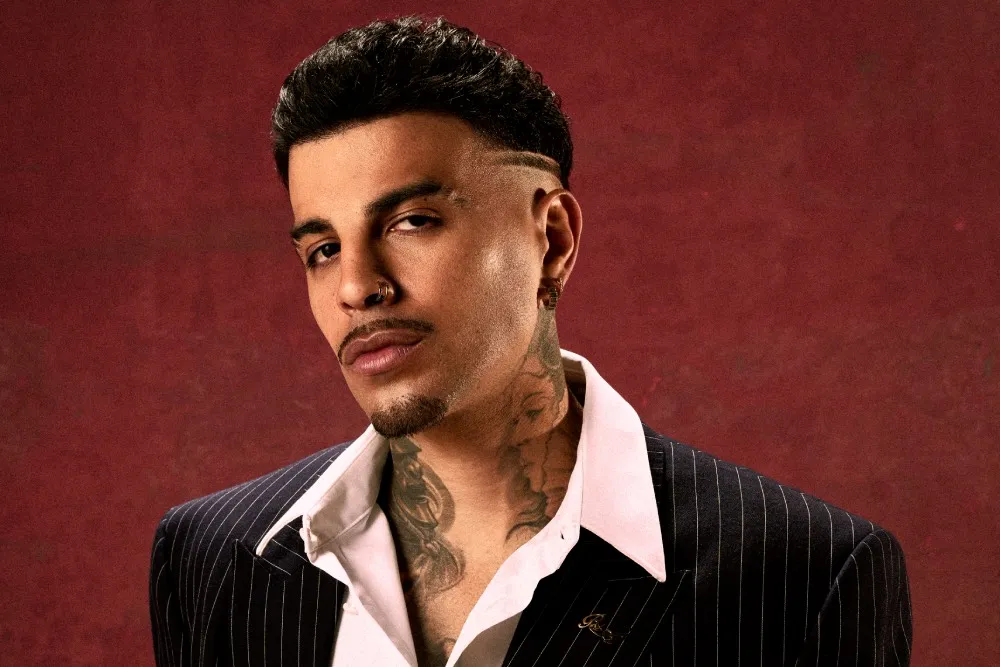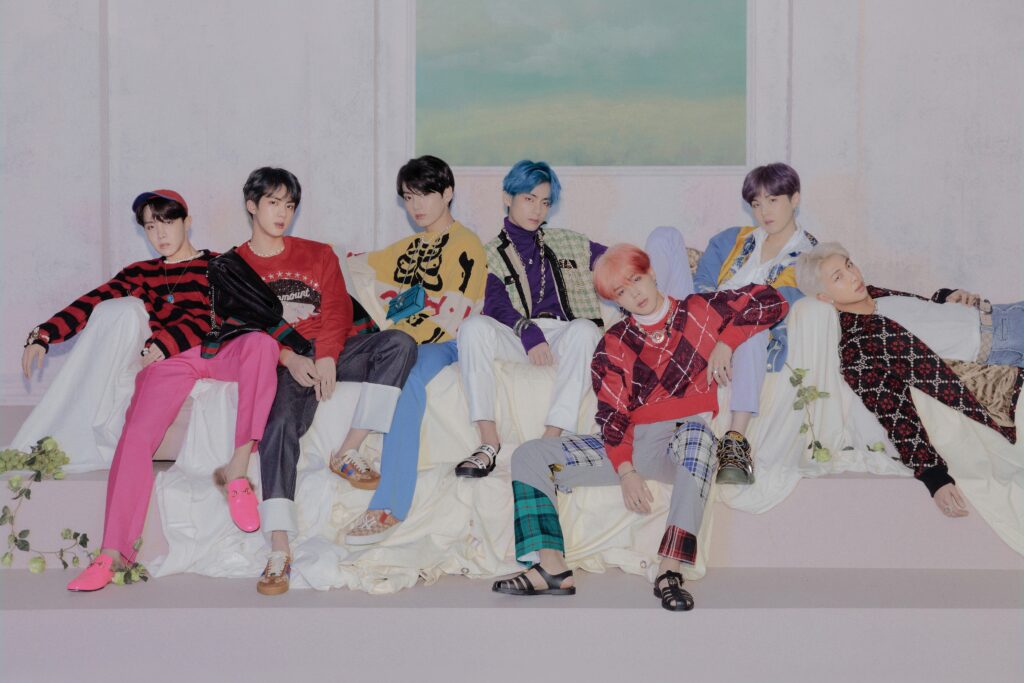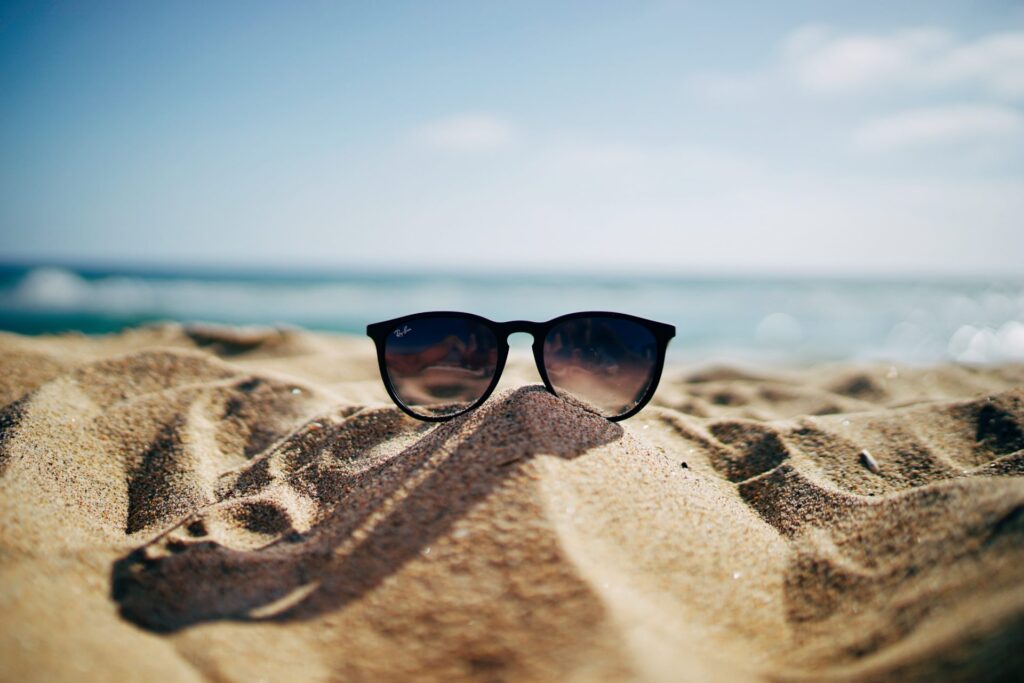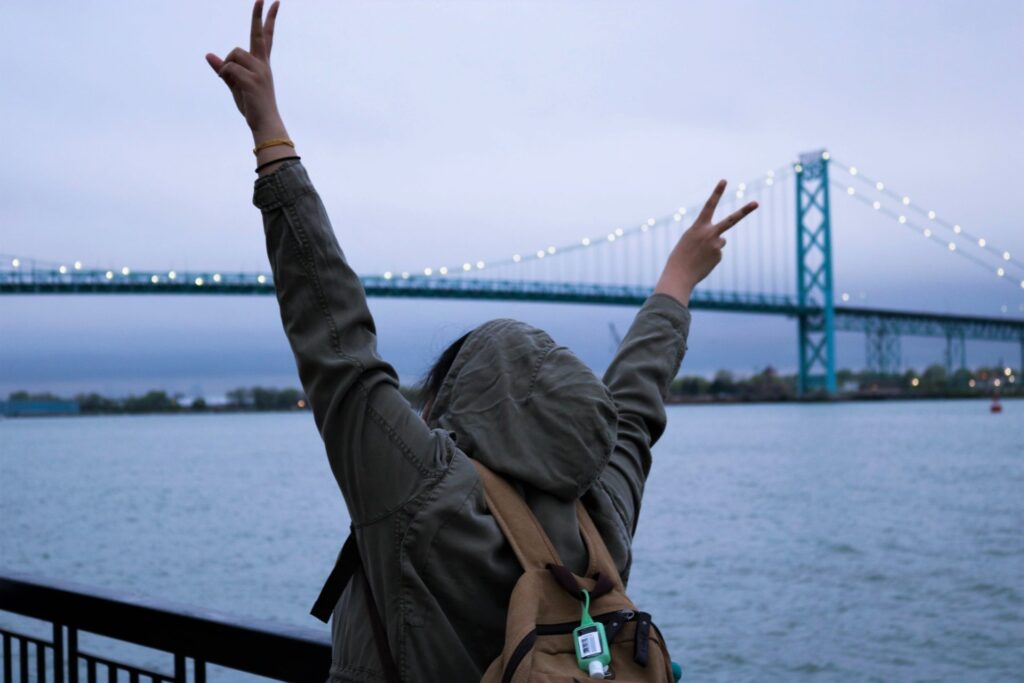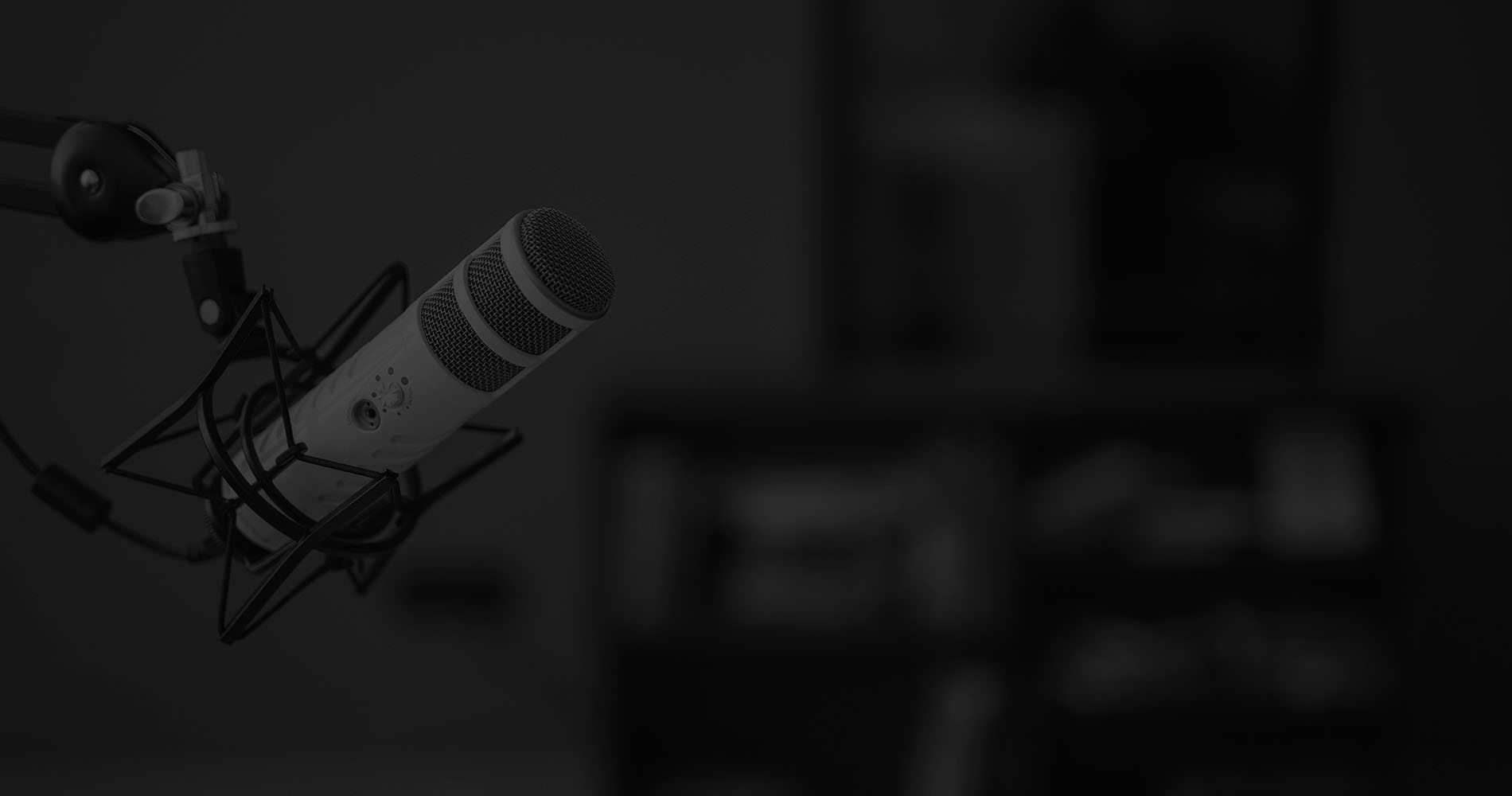Oblivion Access: Weekend Recap
Written by Alberto Najera on May 25, 2022
Earlier this month saw the return of Austin Terror Fest under its new name: Oblivion Access.
As a fan of “underground” music, I’d been looking forward to the festival since the announcement of the lineup that had acts as established as Blonde Redhead, The Microphones, Autopsy, and Melt-Banana to newer artists garnering more recent acclaim like Injury Reserve, Show Me The Body, Blood Incantation, and Portrayal of Guilt. Making the drive from Houston to Austin was a no-brainer for an event this stacked.
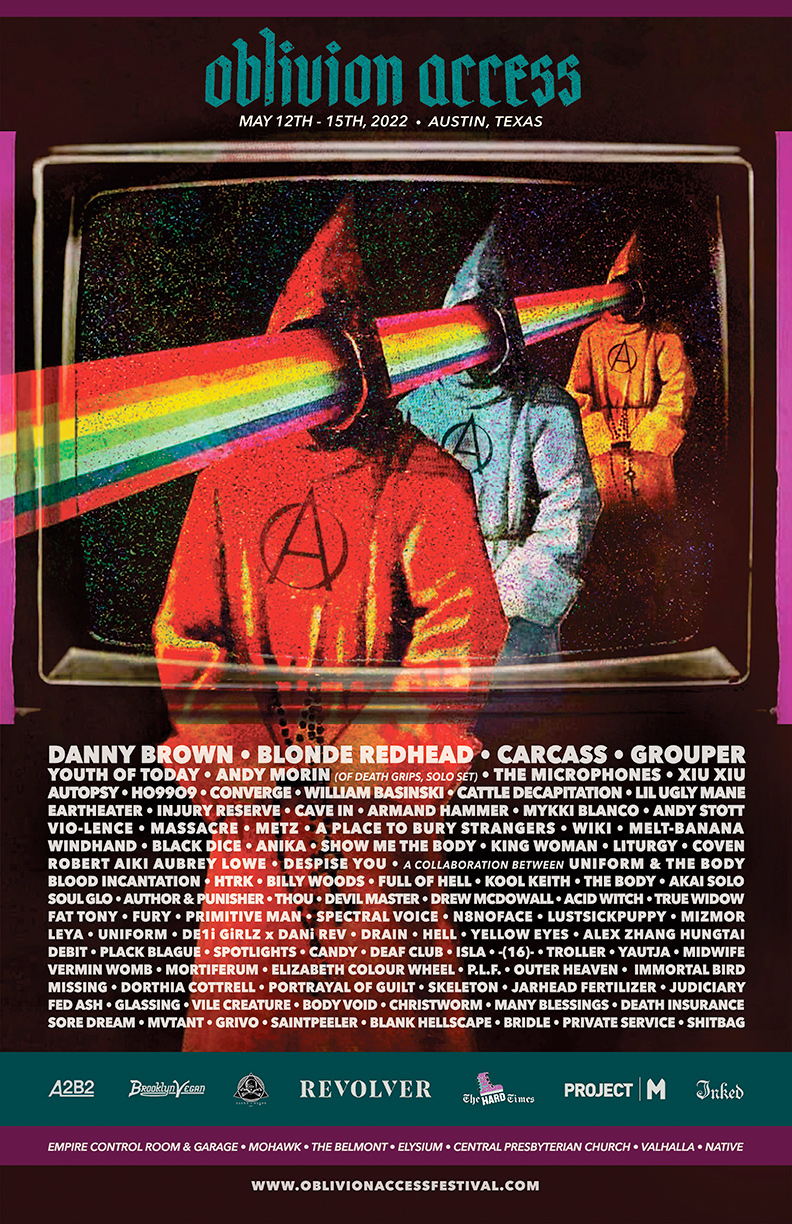
With a whole lineup of powerhouse acts to balance, I admittedly had my reservations about how great of a success the festival could be. On top of that, I wondered how feasible it would be to use multiple venues with so many sets happening at each one. I’d eventually realize that the abundance of talent would more than make up for any issues that might arise over the weekend.
Thursday

Evening show at Mohawk
The act that would kick off my weekend was New York rapper Akai Solo as I arrived at Mohawk in the middle of his set.
Most of his songs followed the same formula of an uninterrupted verse over a one or two bar loop, but Akai’s energy combined with the creativity and grit of the beats made this an enjoyable first set. “Still Sailing” from 2021’s Eleventh Wind specifically stood out as a highlight with its earworm piano beat. Rapper Wiki followed, and his set was everything one would expect from a loud New Yorker missing teeth and wearing an Oscar the Grouch shirt and jorts: a lot of fun.
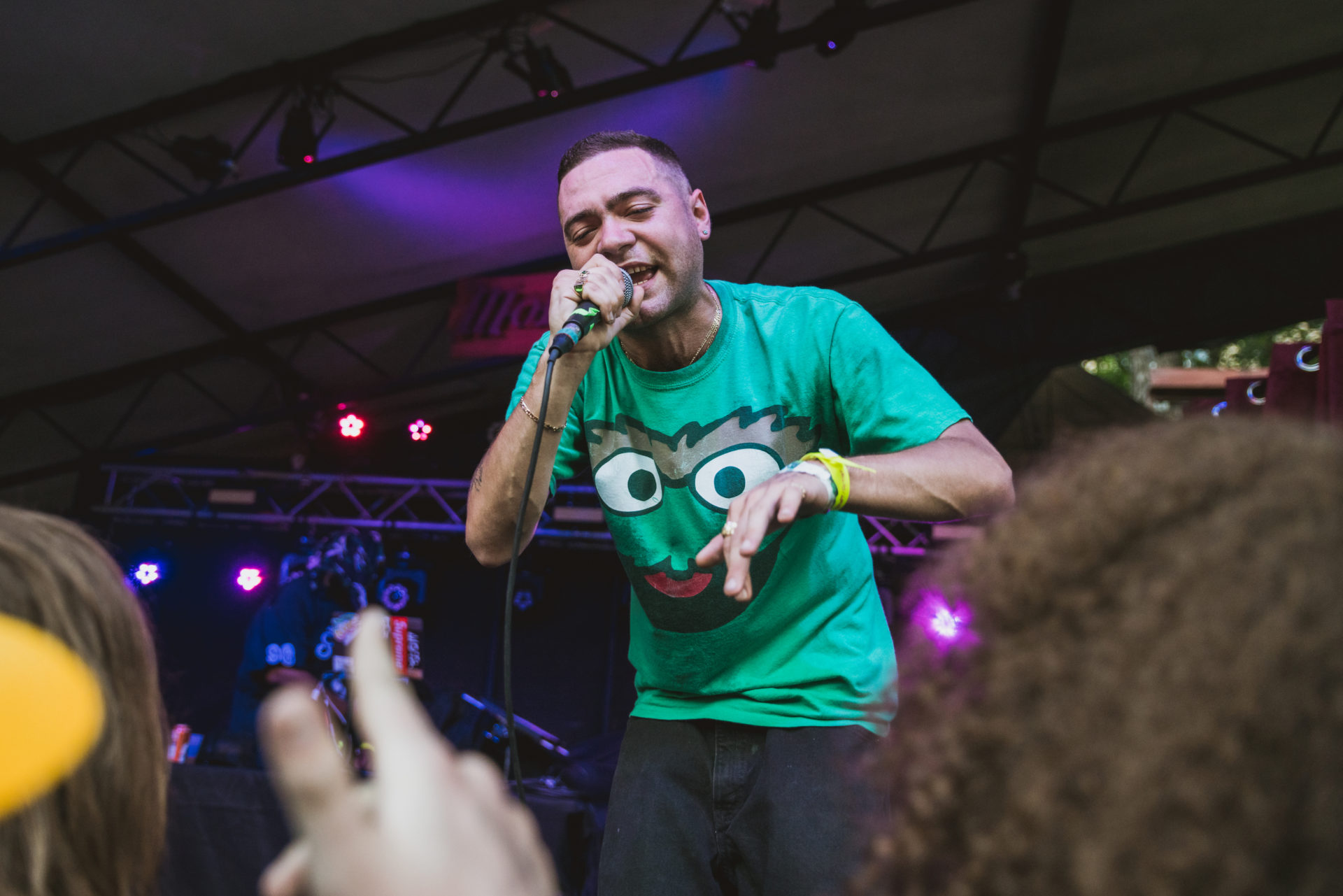
Continuing the New York rap showcase, Armand Hammer, the duo consisting of Billy Woods and ELUCID, were next. Though their music covers some of the same subject matter as the previous artists, their set felt more serious, like their greater life and business experience gave them the wisdom and maturity of elders. Lines referencing Mao Zedong, praxis, and Sodom and Gomorrah might have gone over some of the audience’s heads while they were busy appreciating the grimey beats backing the songs.
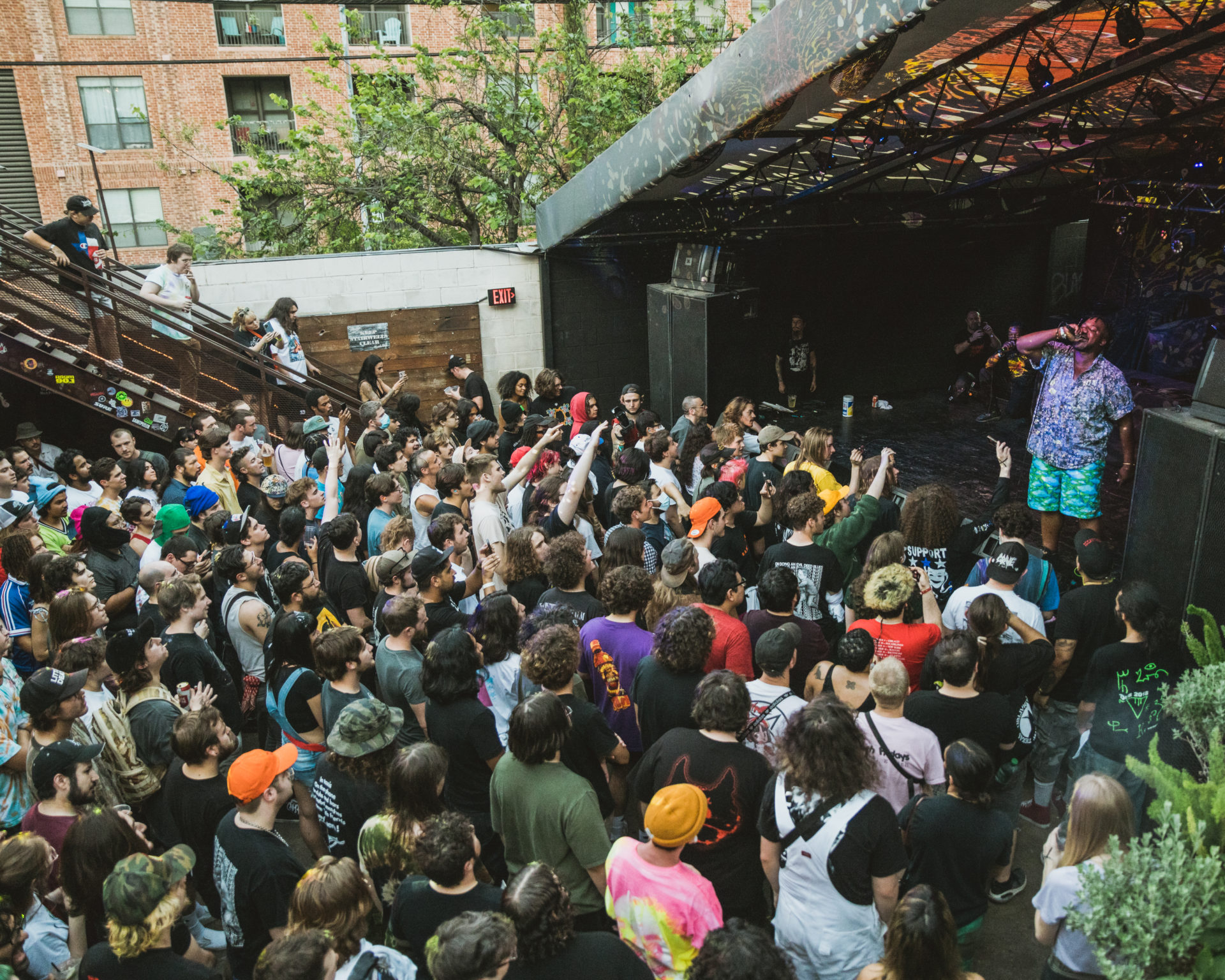
Still, it would be hard for any listener to not appreciate their words with lines about how Woods “swore vengeance in the seventh grade, not on one man, the whole human race” or ELUCID’s “you need permission to have an issue with me, I’m not privy to the stories you live inside”.
Fans of their acclaimed album Haram were undoubtedly pleased as they played a handful of their Alchemist-produced cuts, and fans of Woods’ solo material also were likely happy with the inclusion of tracks like “Spongebob” and “Spider Hole”. Their set could have very well been the headlining set, and I think most wished that time constraints hadn’t kept it as short as it was, but there were still two highly anticipated acts being awaited.
Coming off the release of their experimental By The Time I Get To Phoenix, Injury Reserve came with a set that reflected their recent musical shift. Only playing tracks from this new album, it was clear that they didn’t care to play the hits or “bangers” anymore, opting instead to bend the limitations of hip hop to express their emotions over the loss of groupmate Steppa J. Groggs.
Personally, the set carried tremendous weight and gave me a glimpse of what it was like for the group to lose someone so close, though this didn’t stop others in attendance from partaking in what one could call avant garde moshing. Normally one to never deny an opportunity to shove people, I found myself unable to feel the desire to do anything other than stand there and grieve with the group. “Top Picks For You” hit especially hard live, describing an algorithm that continues to recommend music for a person who is no longer around to listen.
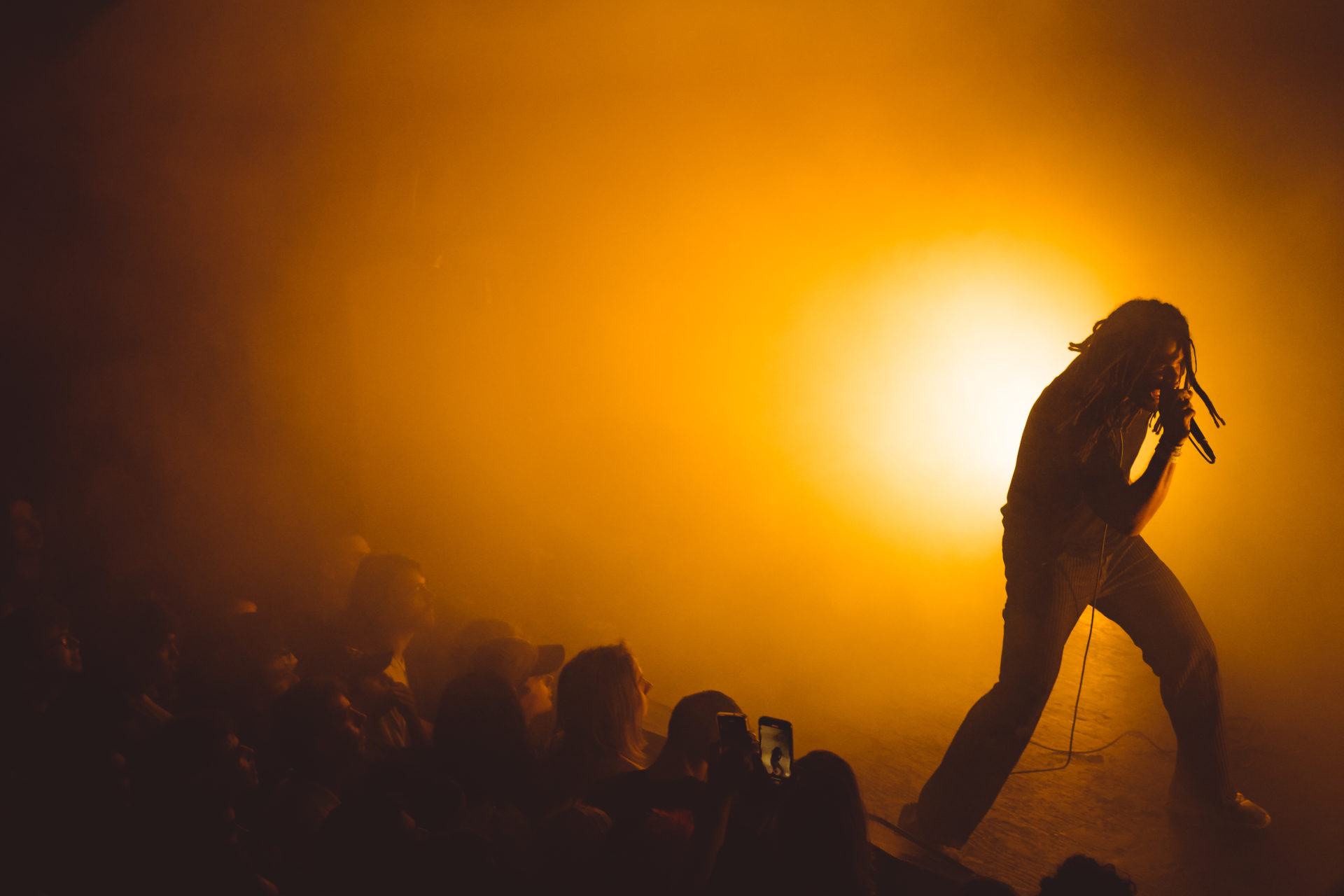
The stage effects added to their set, with the blinding lights and stream of fog adding to the hazy atmosphere established by the music. The culmination of their set came with “Knees”, the only song on their last album to feature a verse from the late Groggs, and nowhere was his presence more missed than here. A part of me felt robbed that I would likely never get the chance to see their high-energy hits like “Jailbreak The Tesla” or “All This Money”, but another more reasonable part of me realized that these tracks wouldn’t be the same without Groggs even if they did perform them. I commend Injury Reserve for taking loss and being able to channel their feelings into such cathartic music.
Leading up to Lil Ugly Mane’s set, I had no idea what to expect. Being a long-time fan, I had seen his music go from Memphis-inspired rap to more serious experimental rap to whatever his last album was. Even in the immediate moments before his set, my confusion only grew with a red curtain being placed on stage along with a large animatronic mascot who went by the name of Thermos Grenadine.
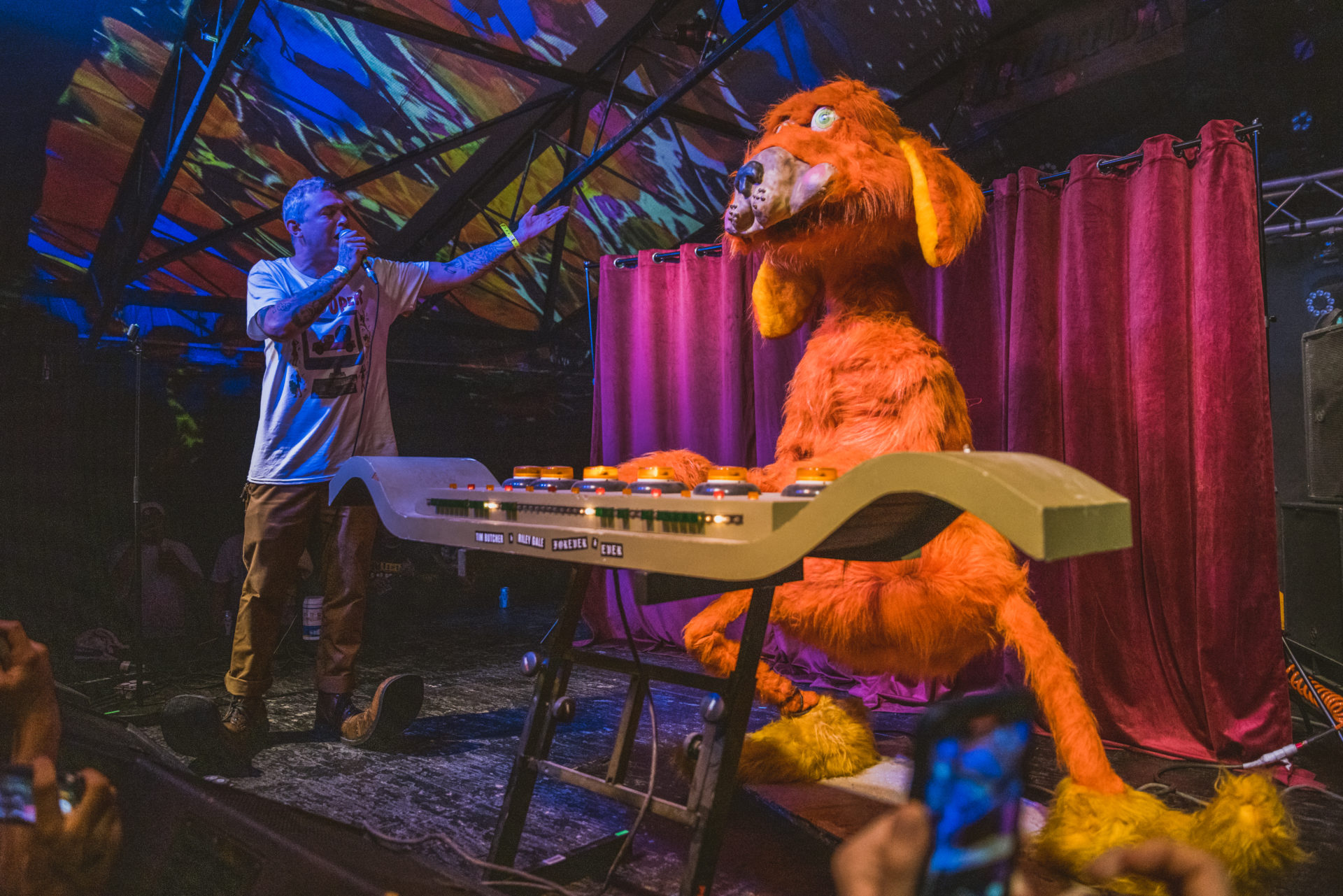
The first song that played was the strangely emotional opener from his last album “bird enemy car” followed directly by Thermos coming to life, introducing himself, and announcing that Ugly Mane would be unable to perform. Of course this did nothing to settle mine or anyone else’s confusion. After some ranting and raving from Thermos, Ugly Mane appeared on stage wearing comically large boots and had some heated exchanges with Thermos until eventually diving right into his set with the classic “Serious Shit”, which flipped a switch in the crowd. Suddenly everyone was moving and singing along to this certified hood classic (for lack of a better term).
For the first half of the set, Ugly Mane played what would probably be considered his hardest tracks from his early days, “Bitch I’m Lugubrious”, “Lean Got Me Fucked Up” and the first part of “Uneven Compromise”. The momentum of the set was halted completely with a sort of intermission narrated by Thermos, which gave me some time to recuperate the energy expended during the first half.
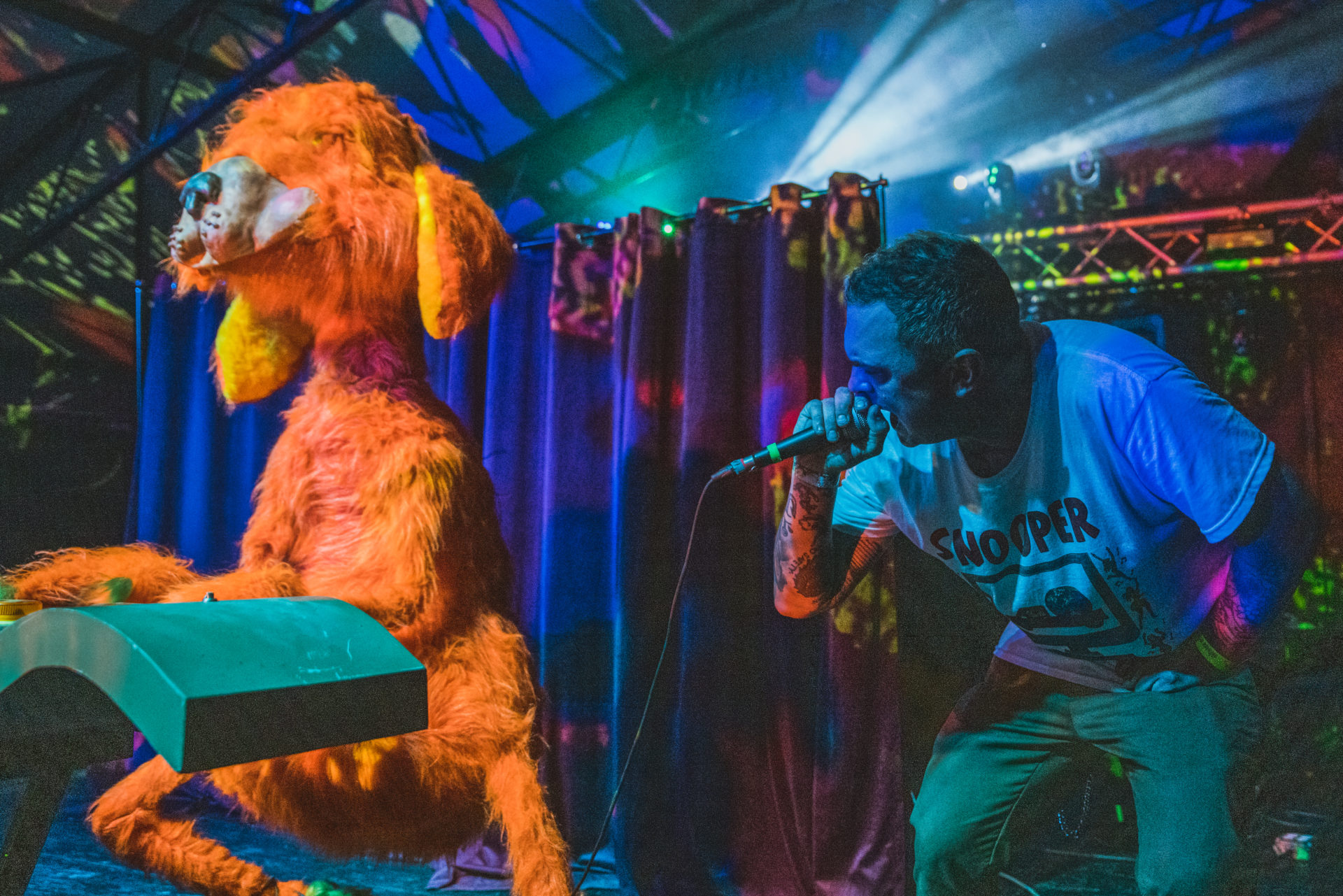
In true Ugly Mane fashion, he switched the mood completely by playing one of his Bedwetter songs, “Stoop Lights”, a song that discusses his struggles with alcoholism over melancholy production. For the rest of the set, Ugly Mane shifted towards his newer more experimental material. The bluegrass “Styrofoam” was a track I was pleasantly surprised to hear, with its fiddle and ragtime-esque piano arrangement and its “if everything was styrofoam…” refrain. By the end of the set, I felt like I had gotten a little bit of everything from Ugly Mane that I wanted.
Evening show at Elysium
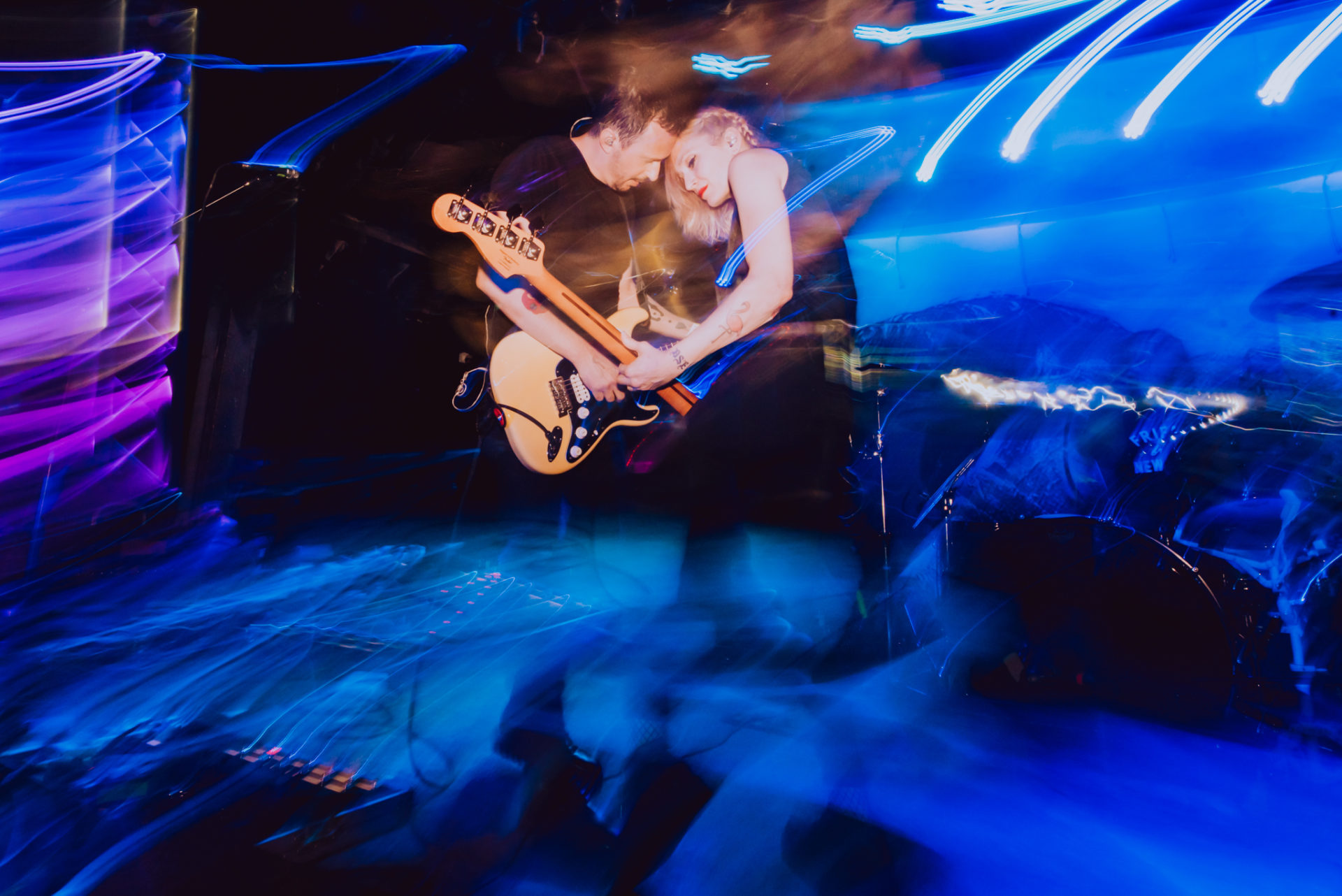
Though I didn’t plan on catching any more shows after the Mohawk one, my friend and I decided to stop by Elysium after passing it on the way back to the hotel and hearing the music inside. I arrived in the middle of Spotlights’ set when I briefly wondered if the volume of the show was safe for my ears before sucking it up for a band that was as hard-hitting as they were. Unfamiliar with the band, I was impressed by their music that was as punishing as it was loud. They played a doom-y kind of alternative metal that was only enhanced by the crushing decibel levels. I found myself genuinely not minding a bit of ear damage to listen to their set. The end of this set seemed like a good note to go out on for my first night of Oblivion Access.
Friday
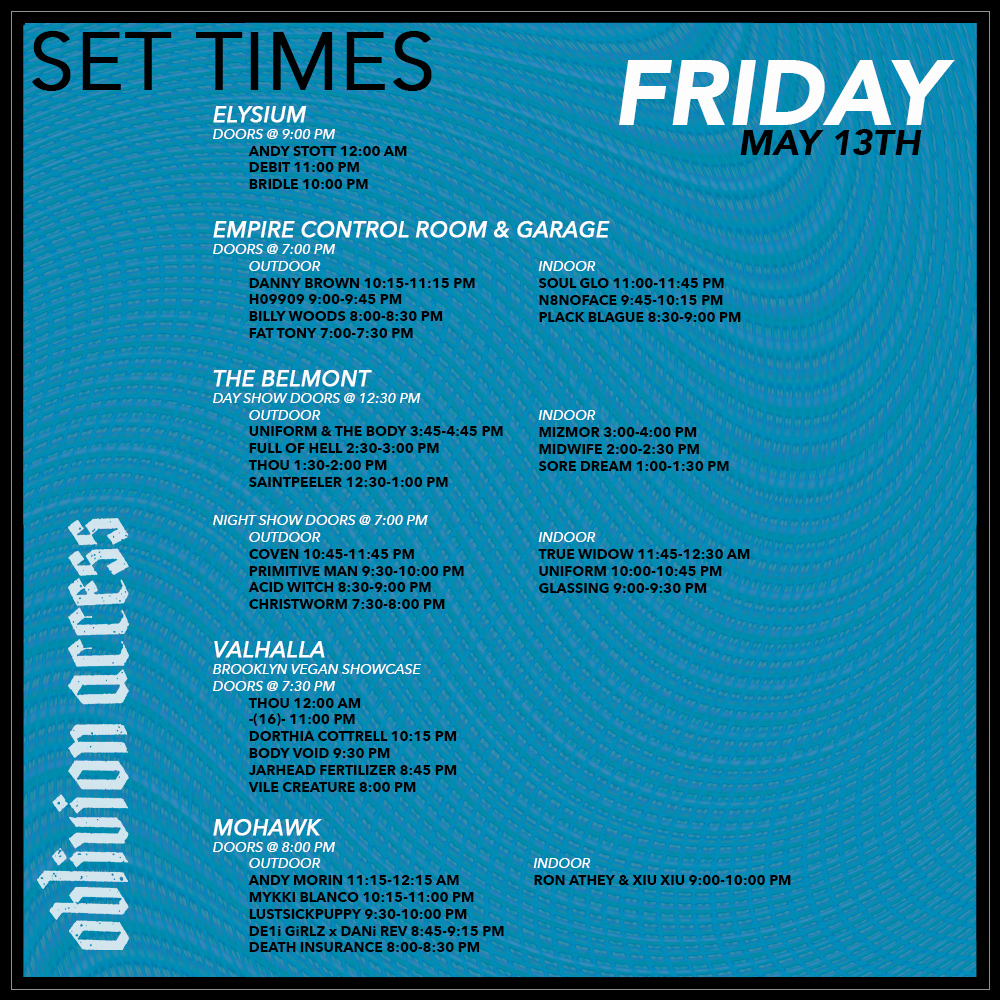
Day show at The Belmont
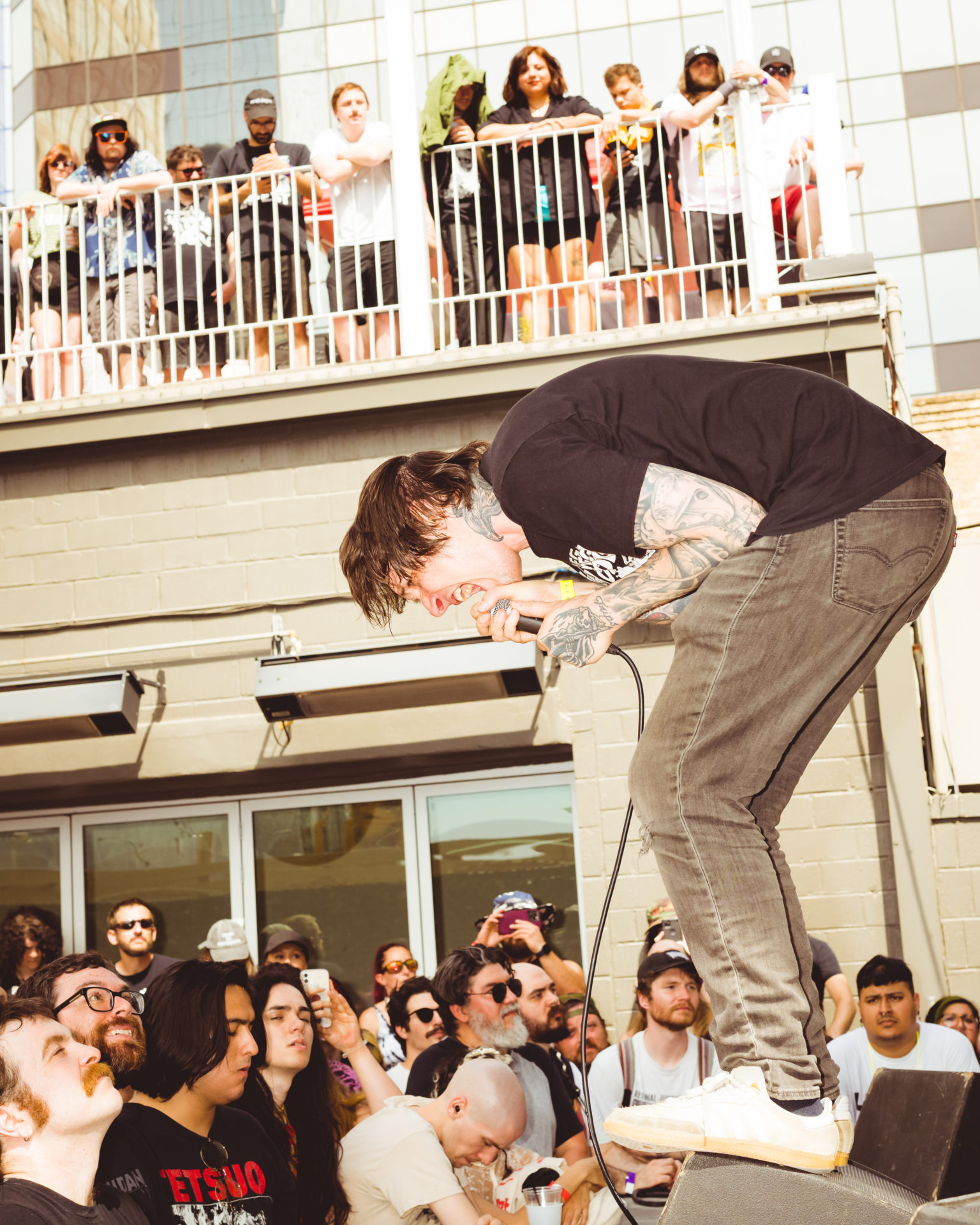
Initially I had no intention to go to this show until my friend wanted to go to see Midwife, who she described as a more ambient, atmospheric musician in contrast to the otherwise metal lineup. Being intrigued by her description and already having interest in Oblivion Access’ choice in metal acts, going to the show was an easy decision to make.
Thou was in the middle of their set as we arrived in time to see their unique take on metal that had both pretty melodies and brutal moments. There was construction happening on the property right next to the venue’s outdoor stage, and as I walked towards the venue I saw the construction workers enjoying their free metal show, bobbing their heads to the music and whatnot.
We left Thou’s set early to wait indoors for Midwife as she was setting up. Because of the minimal nature of her setup, she had to wait until Thou were done performing to keep the outside set from playing over hers.
When she did finally begin, she went into long, droney, hypnotic songs that demanded attention even over loud disturbances that come with a metal show. My friend told me later that Midwife has referred to her music as “heaven metal,” and that certainly made sense to me after having seen her set. For some reason, she made sense on a metal lineup despite not sounding anything like her fellow musicians in attendance.
Not nearly as eardrum-piercing as most other sets I would see over the weekend, her music relied on its beauty instead to captivate. Disturbances that were present during the set almost added to the experience in a weird performance art sort of way, as she continued to perform her music in a venue sprawling with metalheads. In quite the musical feat, Midwife managed to finish her set over the noise from Full Of Hell, who had begun their set during the end of hers. The performance art feeling from before was amplified by Full Of Hell being juxtaposed with heaven metal, both vying for attention in opposite ways that brought a surreal feeling to the whole thing.
Once Midwife had ended, I went out to catch the end of Full Of Hell’s set. It was understandable why they drew a far bigger crowd than Midwife considering the audience; they were as brutal as it got, at least among the performers at that show, and any fan of extreme metal would certainly walk away from their set happy.
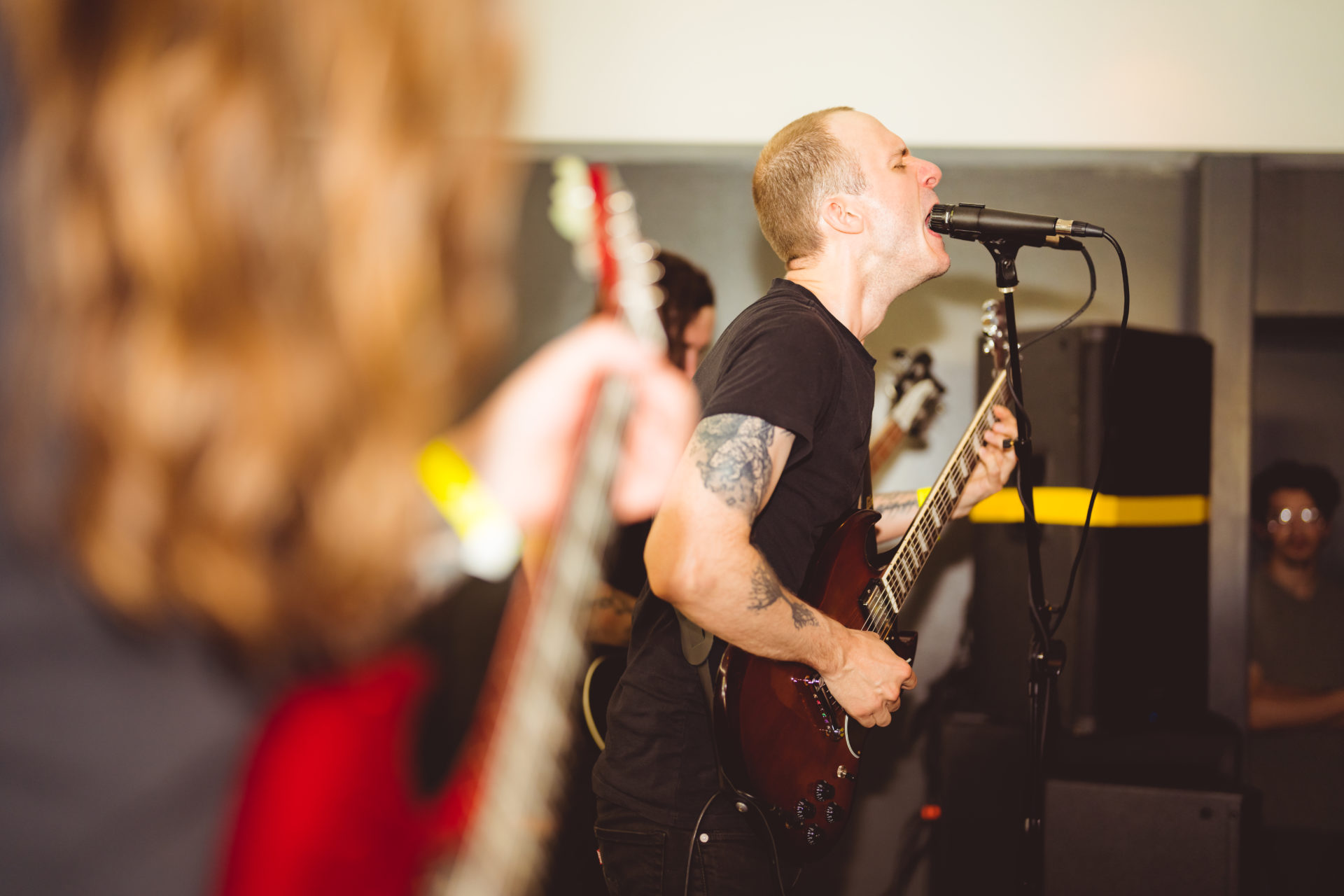
Mizmor had begun setting up back at the indoor stage once Full Of Hell’s set was over. I knew a bit of what to expect from a friend who described them to me. Mine and the crowd’s anticipation only increased with the long wait for the set to begin. As it turned out, technical difficulties would be a problem during this set, bringing back my fears of the festival perhaps biting off more than it could chew with all those acts. When the band eventually did begin, my fears were quickly put at ease again.
I was impressed with their blend of doom, sludge, and black metal that resulted in these massive, hulking songs. Those around me were equally as impressed, as I noticed the crowd increasing in size and everyone paying full attention to the music.
Technical issues unfortunately returned after the end of the first song, with the vocalist mentioning that the vocal mic didn’t seem to be on or very loud at all. I honestly didn’t notice this until it was pointed out because of how captivating the instrumentals were. For the next twenty or so minutes a real effort was made to fix the problem, bringing out impatience in the crowd.
At some point the hostility became pointed towards the sound person, who eventually left either in frustration or to find someone else to fix the issue or both. I’d like to think most people realized it likely wasn’t this person’s fault, but the loudest voices were quick to blame and resulted in an unfair situation for this person. Mizmor themselves had probably grown as tired of the whole situation as everyone else and chose to suddenly go into their next song with no vocal mic. Somehow making himself heard over the huge instrumentals, vocalist A.L.N. did the whole song screaming directly at the crowd, turning an unideal situation into a great moment.
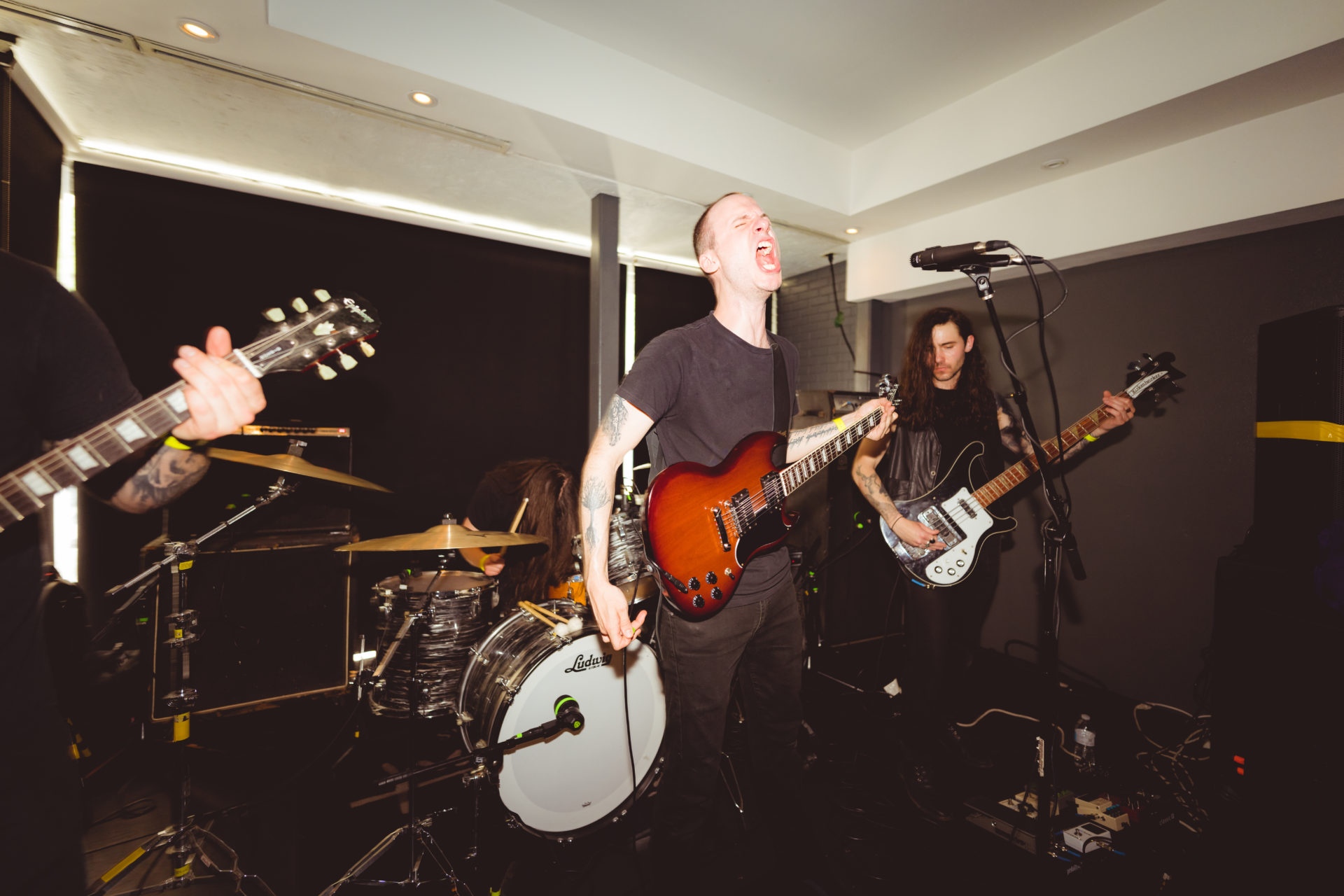
Though the mic problem wasn’t resolved and the second half of the set was done with no vocals, Mizmor still managed to put on a great set nonetheless.
I was able to catch the end of Uniform & The Body’s set after Mizmor, and though I didn’t catch much, their industrial style was something enjoyable that they brought to this show that no other band did.
What stood out to me most about this whole show was that, despite the broad description of just a “metal show,” the acts that Oblivion Access managed to secure for the festival were some of the most unique and innovative bands in the genre today.
Night show at Empire Control Room & Garage
The next show was one that would leave me with a broken phone, a lost press wristband, bent glasses, and some bruised body parts, all of which were ultimately my own fault.
Initially, all was well. Billy Woods was performing a solo set, and having enjoyed Armand Hammer’s set as much as I did, I was more than happy to see him again. ELUCID still joined him on stage, though this time as a DJ primarily.
As it was the night before, Woods’ set was full of his unique delivery containing philosophy, theory, and life experience. A moment that stood out during this set was one from “Remorseless” off of Woods’ recent Aethiopes album where he says “I’m not concerned with generational wealth, that’s its own curse. Anything you want on this cursed Earth, probably better off getting it yourself, see what it’s worth.”
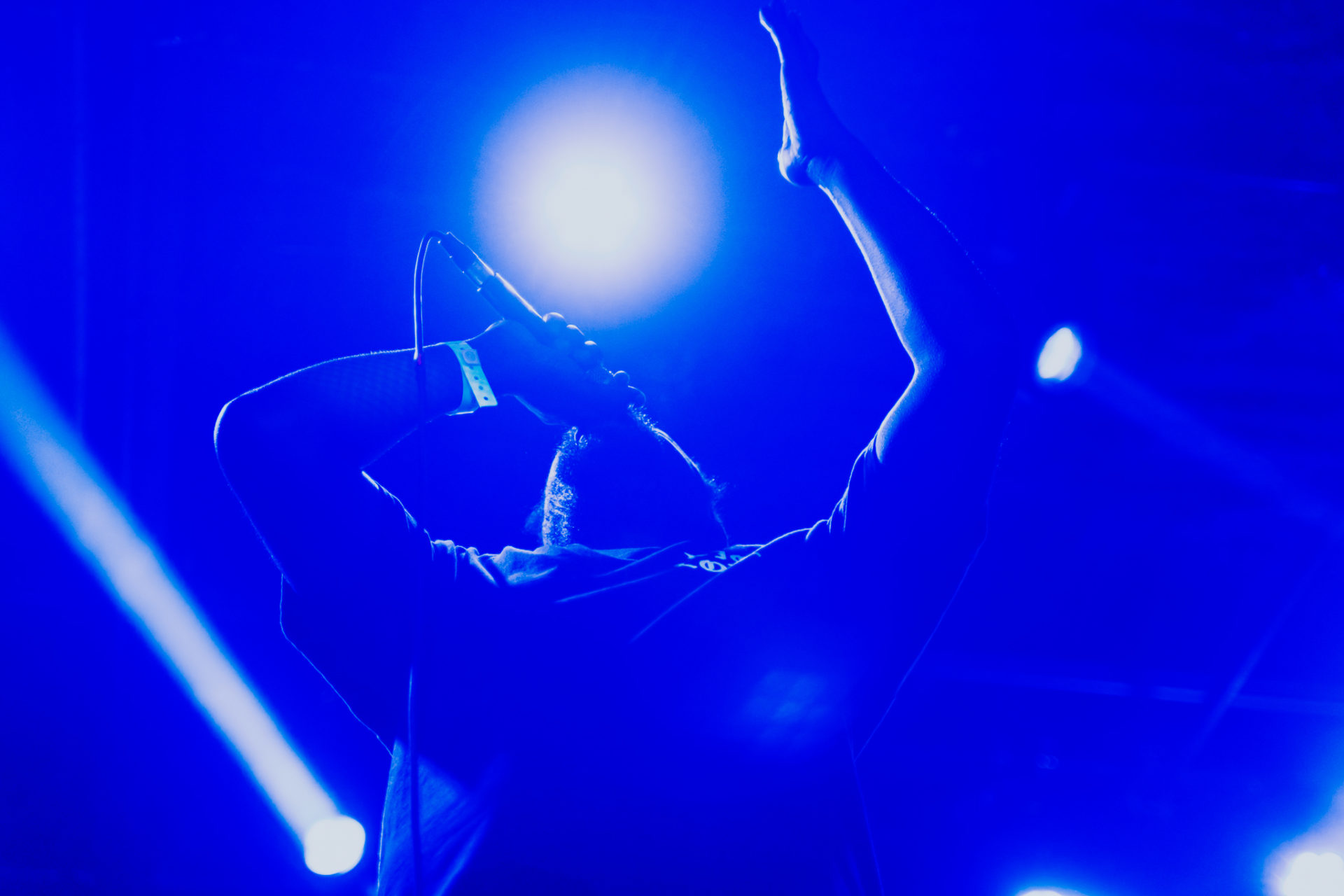
This and songs like “Western Education is Forbidden” took me from a casual listener of Armand Hammer’s Haram to an active fan of Woods. The capacity of music to educate was something that Woods and ELUCID’s performances made sure audiences didn’t forget.
Woods mentioned that they had merch for sale, so after the set I went to go look for it. I scoured the merch area where all the other artists were selling theirs, but I couldn’t find the Armand Hammer booth. I ran into ELUCID himself in my search and asked him where I could find the merch.
“That’s what I’m trying to find out myself,” he replied while looking around the venue.
He and Woods would eventually set up shop next to all the other artists, having waited until after their set to do so. I was one of the first people in line, and the merch I had my eyes on was what Woods called a “white label record.” As I was next in line, I asked Woods what exactly the white label was. He told me it was a handful of unreleased songs that had no plans for a digital release with production from Earl Sweatshirt, The Alchemist, and others. I remember vividly how Woods was trying to think of other collaborators present on the record as if I needed to be sold further on this concept. The duo was nice enough to sign anything for anyone who asked, so the signed WHT LBL now sits in my collection as one of the coolest things I own.
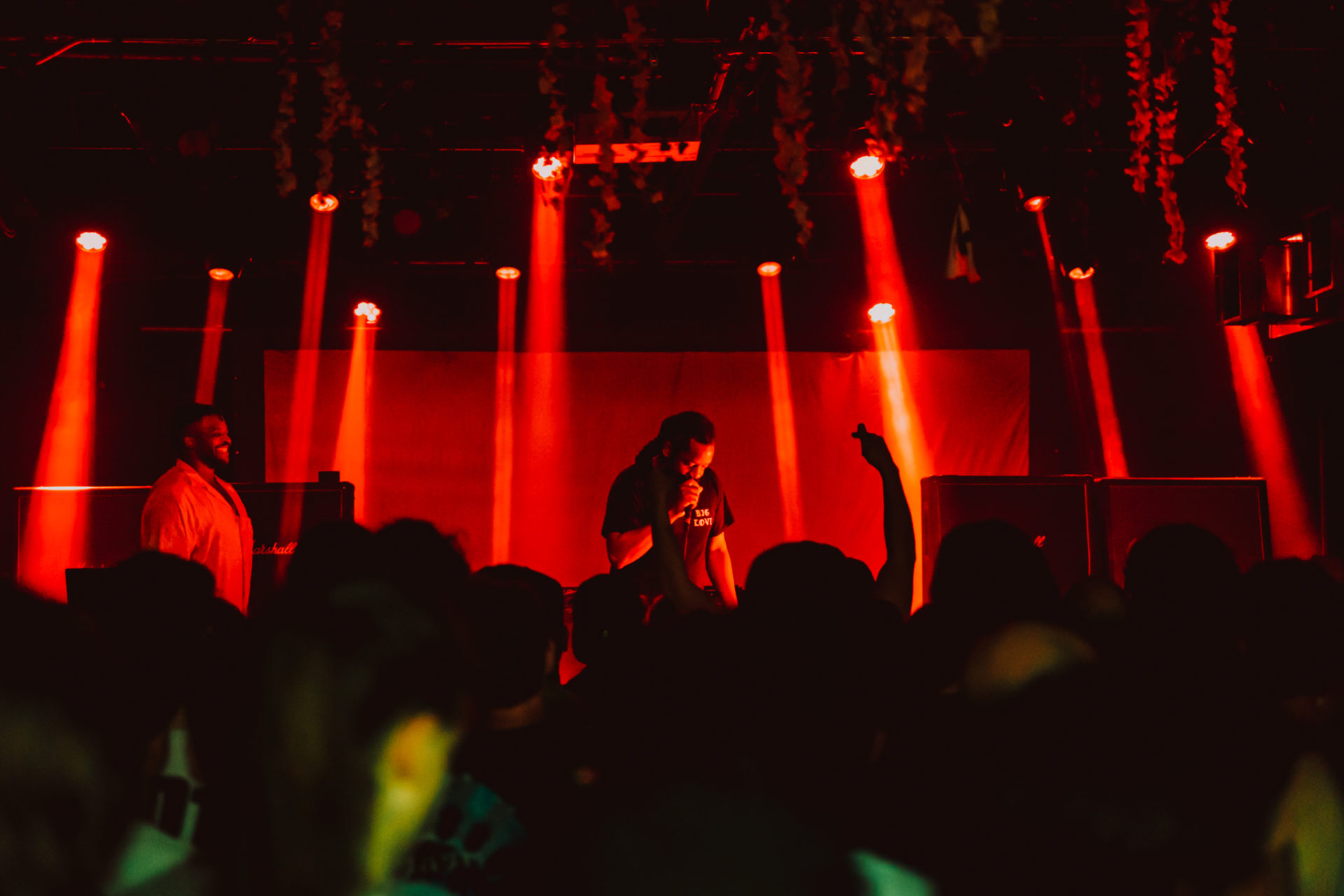
Besides being incredible artists, it should also be noted that Woods and ELUCID are both extremely nice people. They not only signed anything asked of them, but never denied any pictures and carried genuine conversations with fans. No artists the whole weekend seemed as down to earth and thankful for support as Armand Hammer, and I felt it something I had to acknowledge.
Funnily enough, I would meet a different pair of artists shortly after this, but not a pair that was performing that day. As I was walking around the venue, this older Japanese couple stood out to me because of how cool (for lack of a better term) they were dressed. After connecting some dots in my head, I realized that this was no regular old, hip Japanese duo, but it was in fact Melt-Banana, who would be performing at the venue the next day. I approached them with a friend to tell them I was a big fan of theirs and singer Yako was kind enough to take a picture with me.
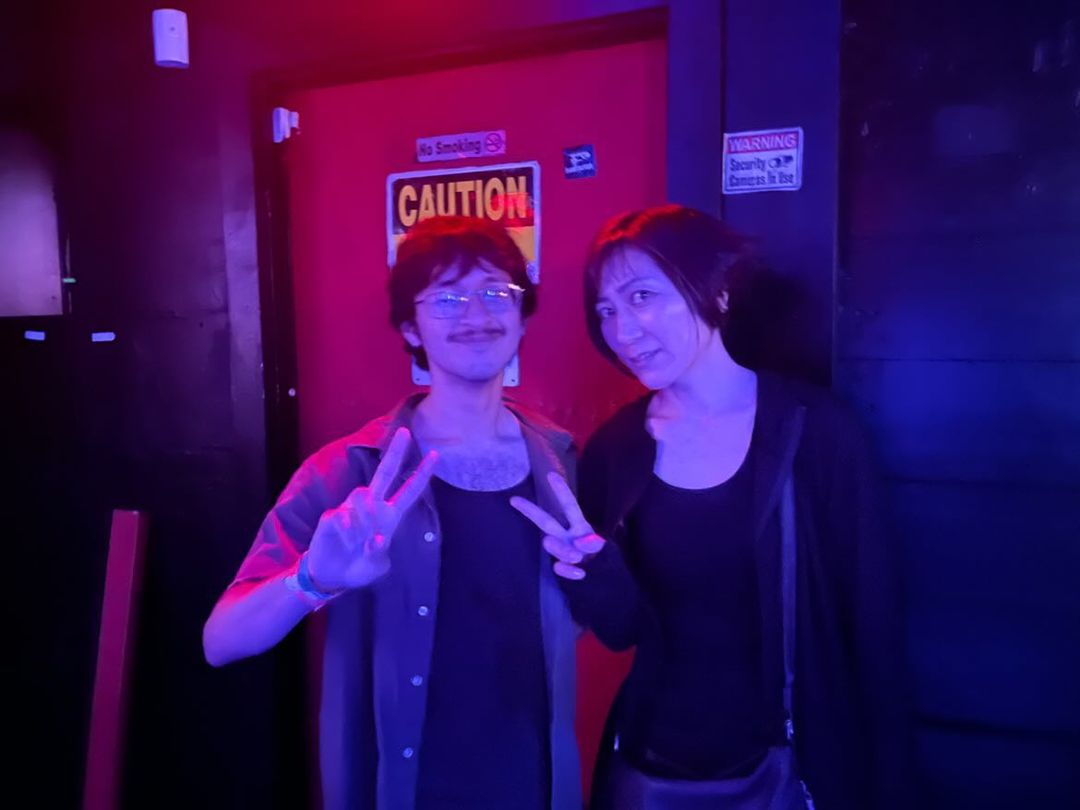
The first inconvenience of the night came while waiting for rap punk group Ho99o9’s set at the outdoor stage. Apparently, the set had been pushed back significantly to the surprise of everyone in attendance, and my friend and I gave up after about 40 minutes of waiting. N8NOFACE was about to go on back at the indoor stage at his regularly scheduled time, so we opted to go see him instead. This set would be the source of a series of personal misfortunes for myself.
Another punk — albeit a synth punk — N8NOFACE brought electronic music together with a raw LA feel to his set. Unlike the larger shows, his set spawned a more traditional punk mosh pit: a small circle, a handful of people marching around in it, and a lot of swinging arms and legs. As I had my signed Armand Hammer white label record in my hand towards the back of the crowd, I didn’t feel the need to jump in the pit at any point, but this changed when my friend arrived.
N8NOFACE announced his last song, prompting more people to get in the pit than previously had. My friend offered to hold my things so I could jump in, and after initially declining at first, she convinced me with very little argument. I immediately knew I had made a mistake after receiving blows from all sides, including a tough knee to the thigh. My glasses were even knocked off my face, though I was surprisingly able to get them back off the floor only a little bent.
All in all, I stayed in the pit for maybe 15 seconds. I didn’t realize it initially, but the bruises I got would be the least troublesome thing to occur from those 15 seconds. I’d soon find out that my phone had been broken while in my pocket, and my wristband — the one to get me into all the festival shows — had somehow been yanked off my arm.
The discovery of my broken phone happened while waiting for the next show, Danny Brown. In the crowd with my friends, I went to check my phone and was met with a black screen and a bent frame. Trying to hit every button and even bend the phone back in place surprisingly had little effect. The pocket holding my phone wasn’t even the pocket on the thigh where I got hit with a knee, meaning that I unknowingly took a similar hit to my other thigh and didn’t realize because my phone broke the impact. I decided to try to take my loss in stride and go about the rest of my night like normal.
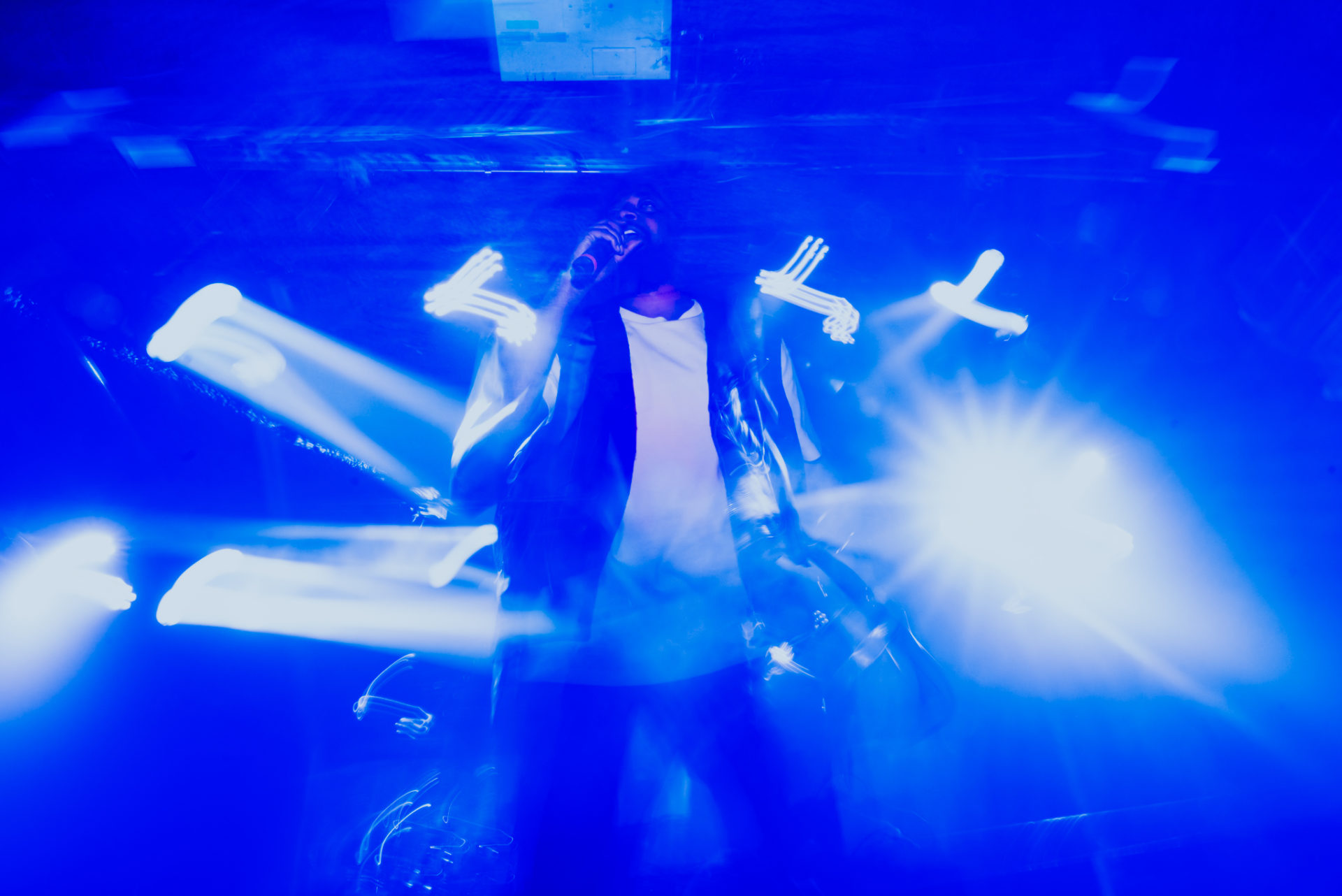
I’d already seen Danny Brown twice before, so I knew to expect a lot of fun from his set. Opening with the early 2010’s banger “Molly Ringwald” and going into songs from his EDM-influenced album Old, my expectations proved accurate. His more experimental Atrocity Exhibition tracks also energized the crowd. Though his set felt slightly short, it was still a good time for fans and non-fans alike, and for a while it made me forget about my broken phone.
To add even more injury to injury, I’d discover my lost wristband after this set, when my friends and I decided to try to catch Andy Morin’s DJ set at Mohawk.
Upon arrival at Mohawk after a short walk, I went to show the person at the door my wristband and was very surprised to find it wasn’t there. After (probably fairly) being denied entry, I decided to call it a night before I invited any more bad luck. I ended day two having lost probably the two most important things I needed that weekend, but was going to try to turn things back in my favor.
Saturday
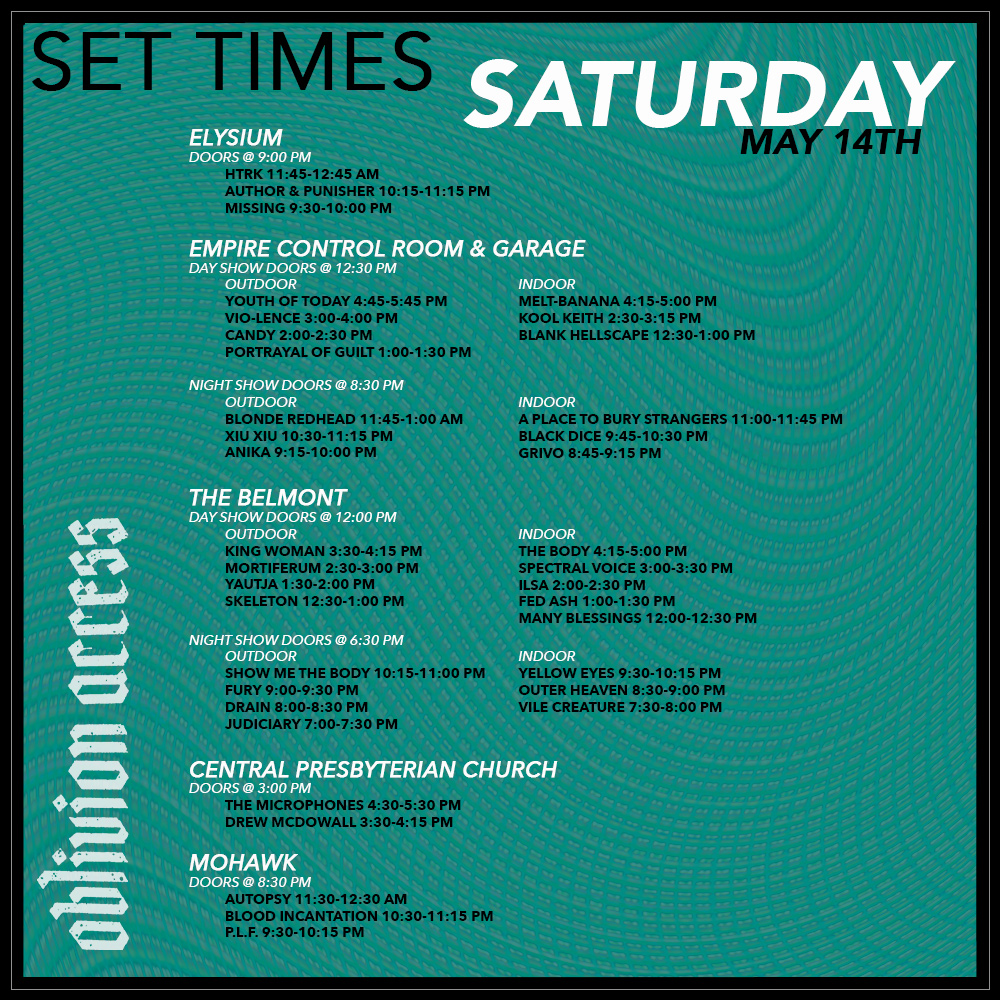
First, I had to figure out my wristband situation before I did anything else. Regarding my phone, I decided to just take my loss and either stick with a friend or jot down any locations and set times I would need for the remainder of the weekend.
I went back to Native Hostel where I had picked up my wristband initially expecting a difficult time explaining my situation, but was met with very understanding staff who were very quick to lend a helping hand. With their help, I was able to attend the rest of the weekend with no issue (a big thank you to Trey and the blue-haired person at Native Hostel who helped me out).
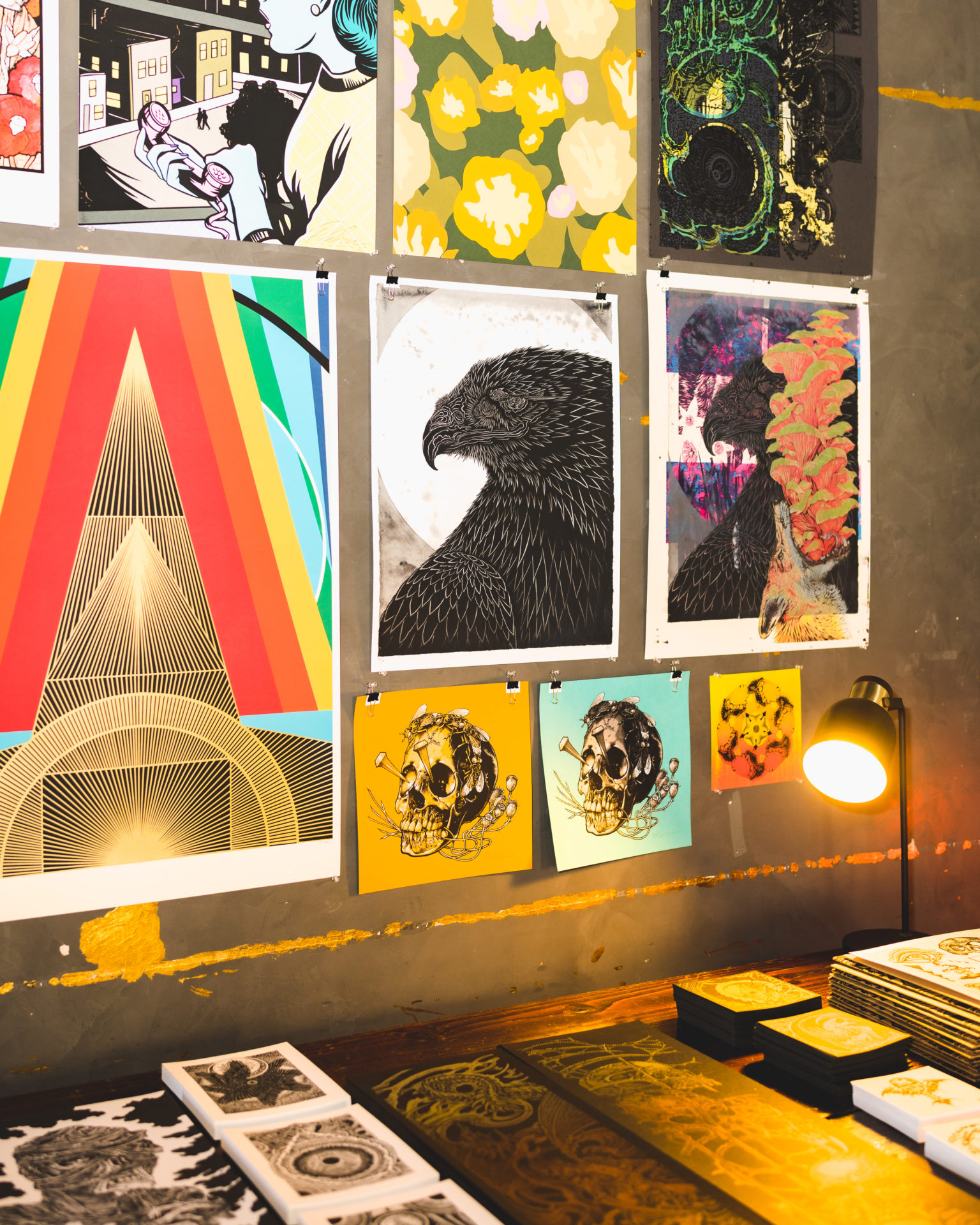
While still at Native Hostel, I decided to check out Night Swim Gallery’s Vendor Village. There was a lot of nice art and a lot of nice people, and I decided to buy a couple prints by Keenan Bouchard, whose style I enjoyed very much. There was a lot of merch for sale at Native Hostel, merch that I definitely would have indulged in had I not already bought so much at shows, but this to say that it would’ve been impossible for someone attending to not buy something cool the whole weekend.
Day show at Empire Control Room & Garage
Having bounced back from the night before, I felt more than ready to go to this show, mainly for Melt-Banana.
I was also anticipating the first act of the day as well, Portrayal of Guilt. Their set got the show off to a good start, riling up the crowd with their hard take on black metal.
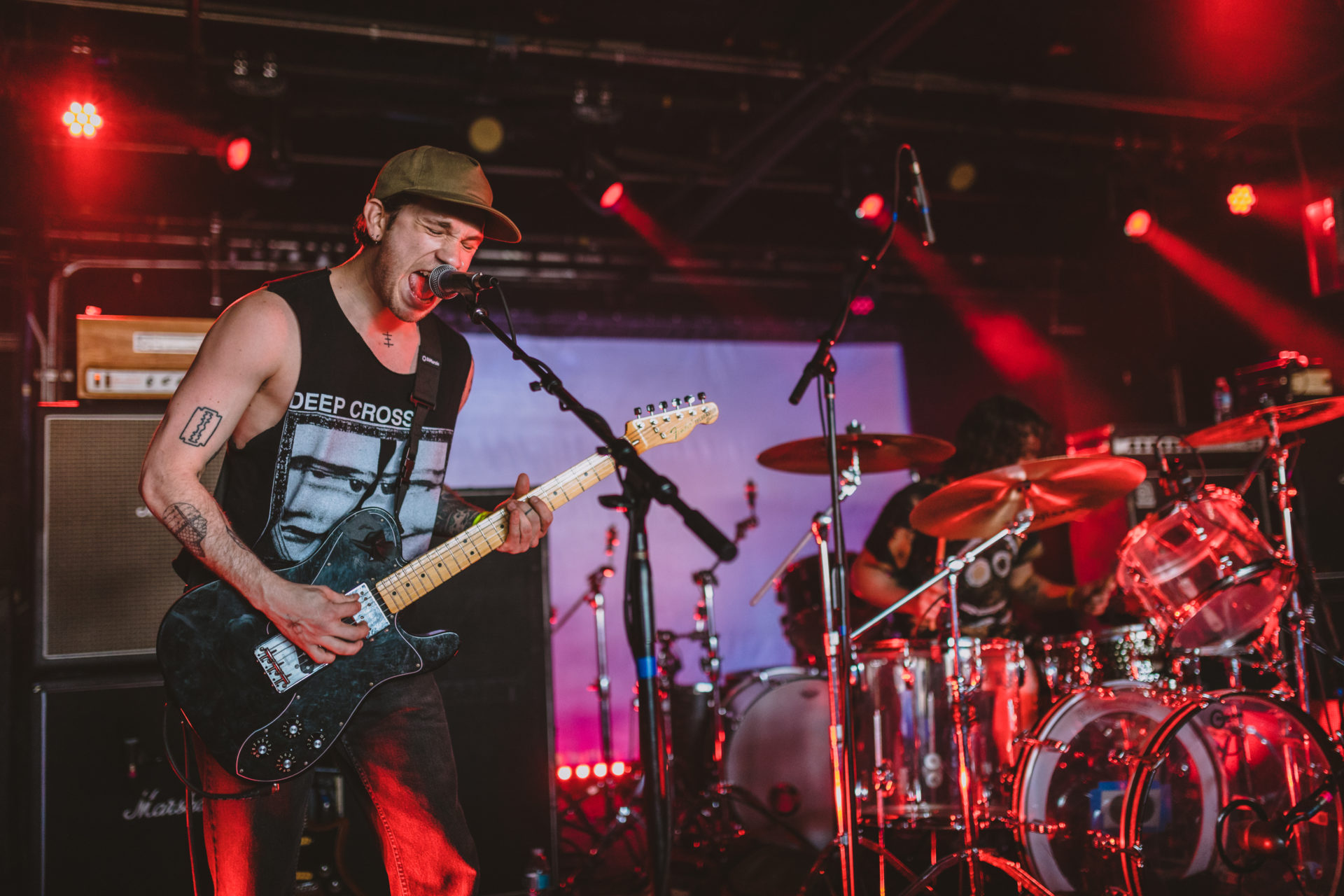
Austin local Blank Hellscape took the indoor stage shortly after. I was unfamiliar with Blank Hellscape before their set, but was made a fan by their performance. They played a noisy, industrial kind of electronic music that might even be considered harsh noise by some. The music sounded to me like what might play at a club in hell, and I loved that. Vocalist Andrew Nogay’s screams of pain and anguish over these tracks made the music even more uncompromising and extreme, giving the impression that it was cathartic for him.
The next set at the indoor stage brought a great stylistic change with rapper Kool Keith. Overflowing with charisma, many like myself who were unfamiliar with his music were still drawn to his stage presence and boom bap, New York style hip hop. Donning a highlighter yellow polo, it was clear that he was as confident on the stage as he was anywhere else.

Many moments had me bent over laughing, like one moment where he freestyled acapella for maybe 30 seconds and then immediately followed it with “I don’t rhyme like that, but some motherfuckers do, though,” or another freestyle over DJ Shadow’s “Midnight In A Perfect World” where he rapped about hardships growing up before abruptly ending it with “[the DJ’s] trying to make me sad.” Despite seeming to freestyle a great portion of his set, Kool Keith always kept the crowd entertained, a different example being a freestyle over the “Shook Ones, Pt. II” beat. I enjoyed Kool Keith’s set a lot more than I thought I would.
Next were one of my most anticipated acts of the whole weekend: the legendary Melt-Banana. Having created an unmatched blend of noise rock, punk, and hardcore for the last three decades, the group had a reputation that preceded them. Like Armand Hammer, they were one of the groups running their own merch before their set, and were also very gracious to those who stopped by, including by granting my friend a portrait on his camera.
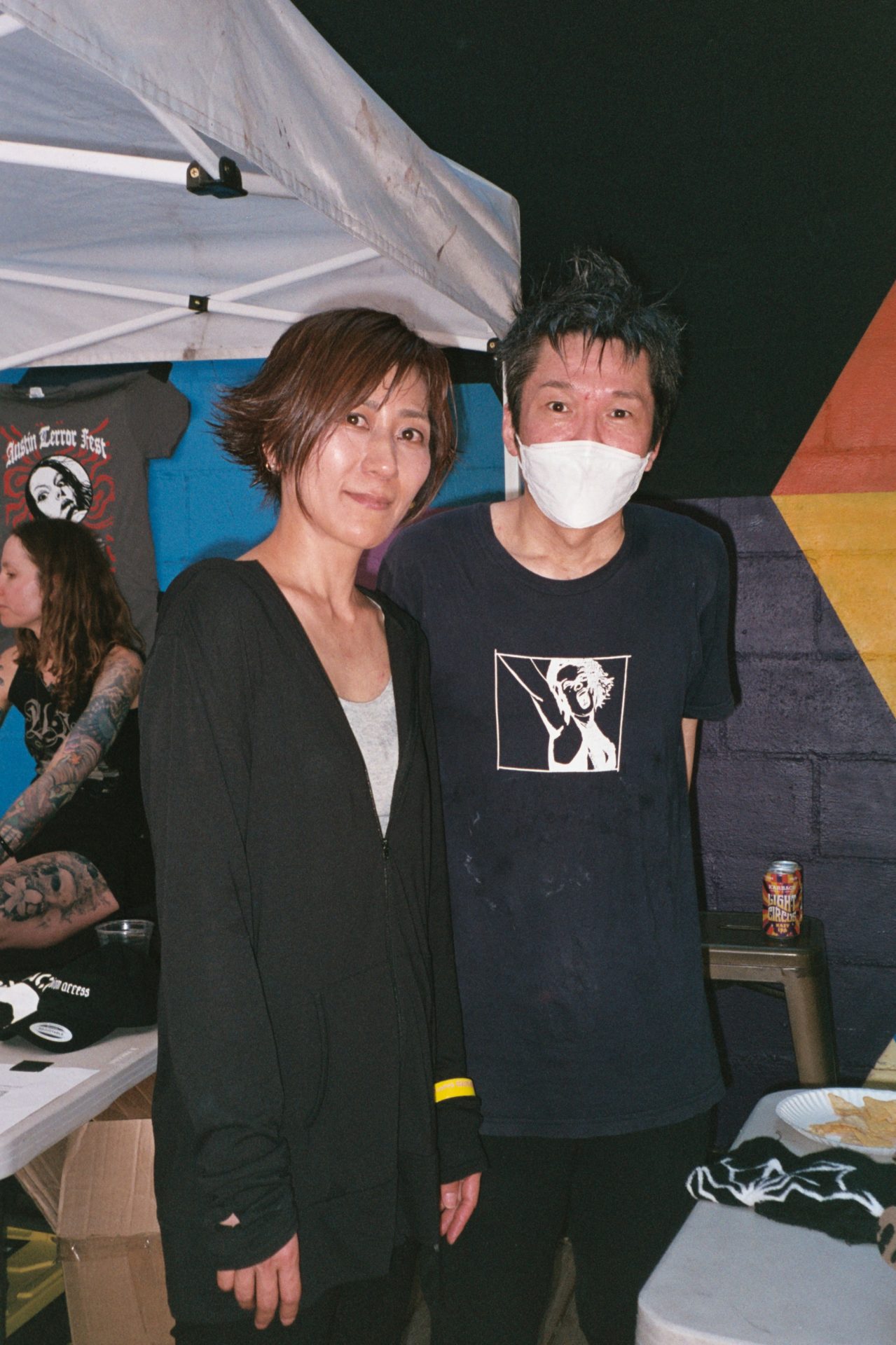
The anticipation grew for their set as they set up on stage. The beginning of their set brought a level of energy from the band and from the crowd that I wouldn’t see matched for the rest of the festival. With a drum machine controlled by singer Yako and the expert guitar work of Agata, the band sent the crowd into a frenzy. I spent the first half of the set in the pit before choosing pit retirement. As a peaceful observer, Melt-Banana’s set was still incredible and their virtuosity over their craft left me questioning how it was even possible for two people to make such a chaotic sound.
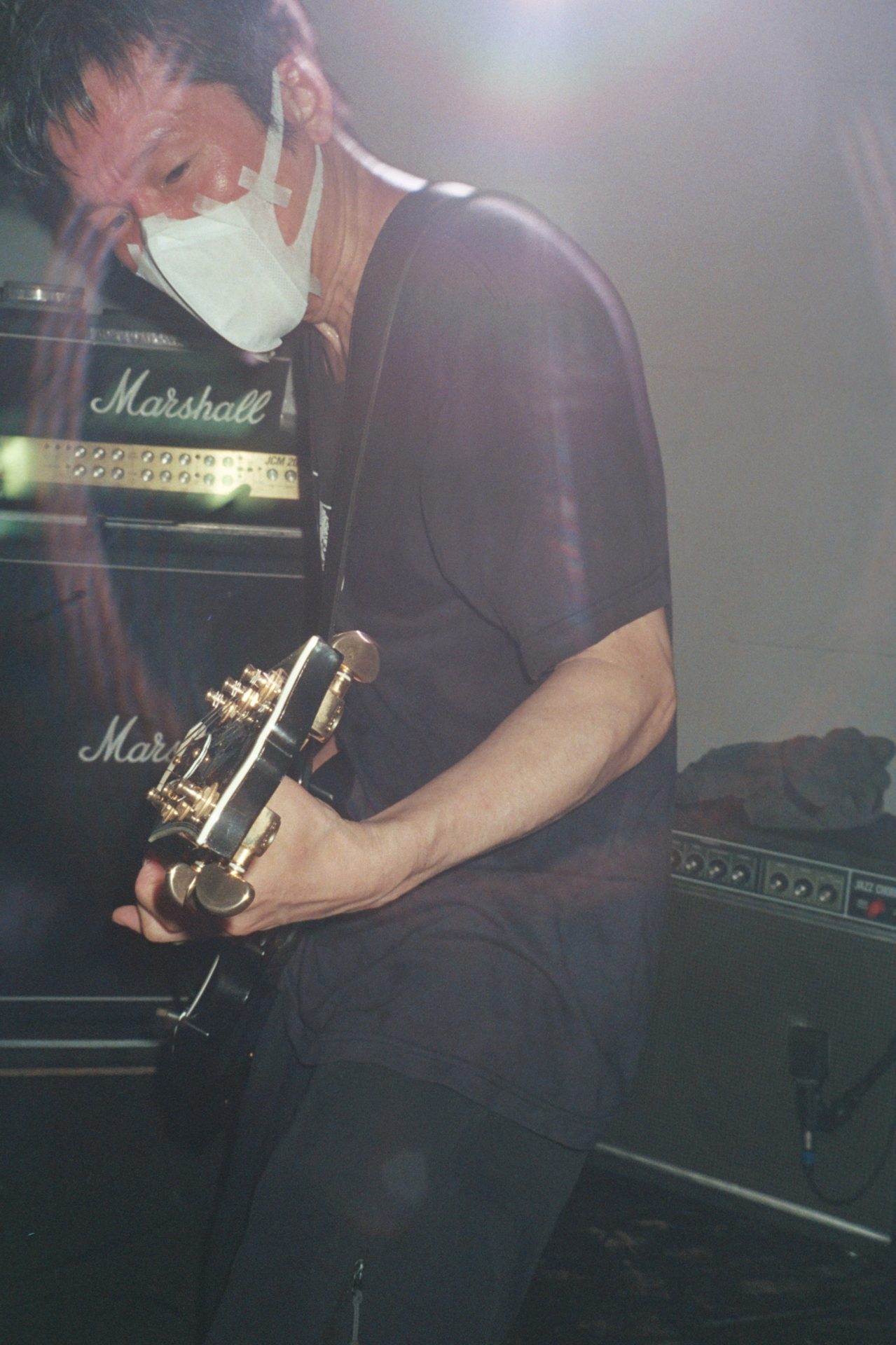
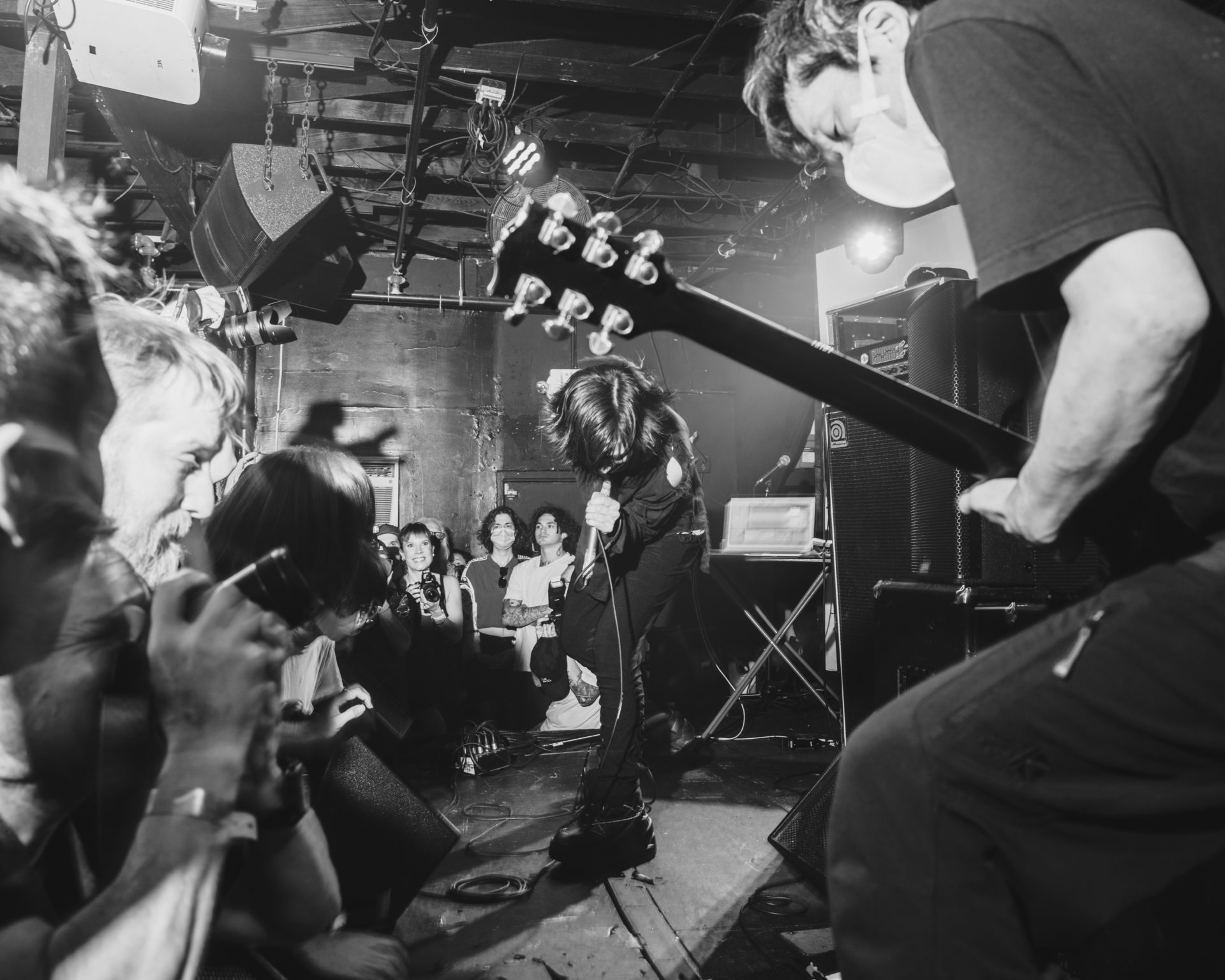
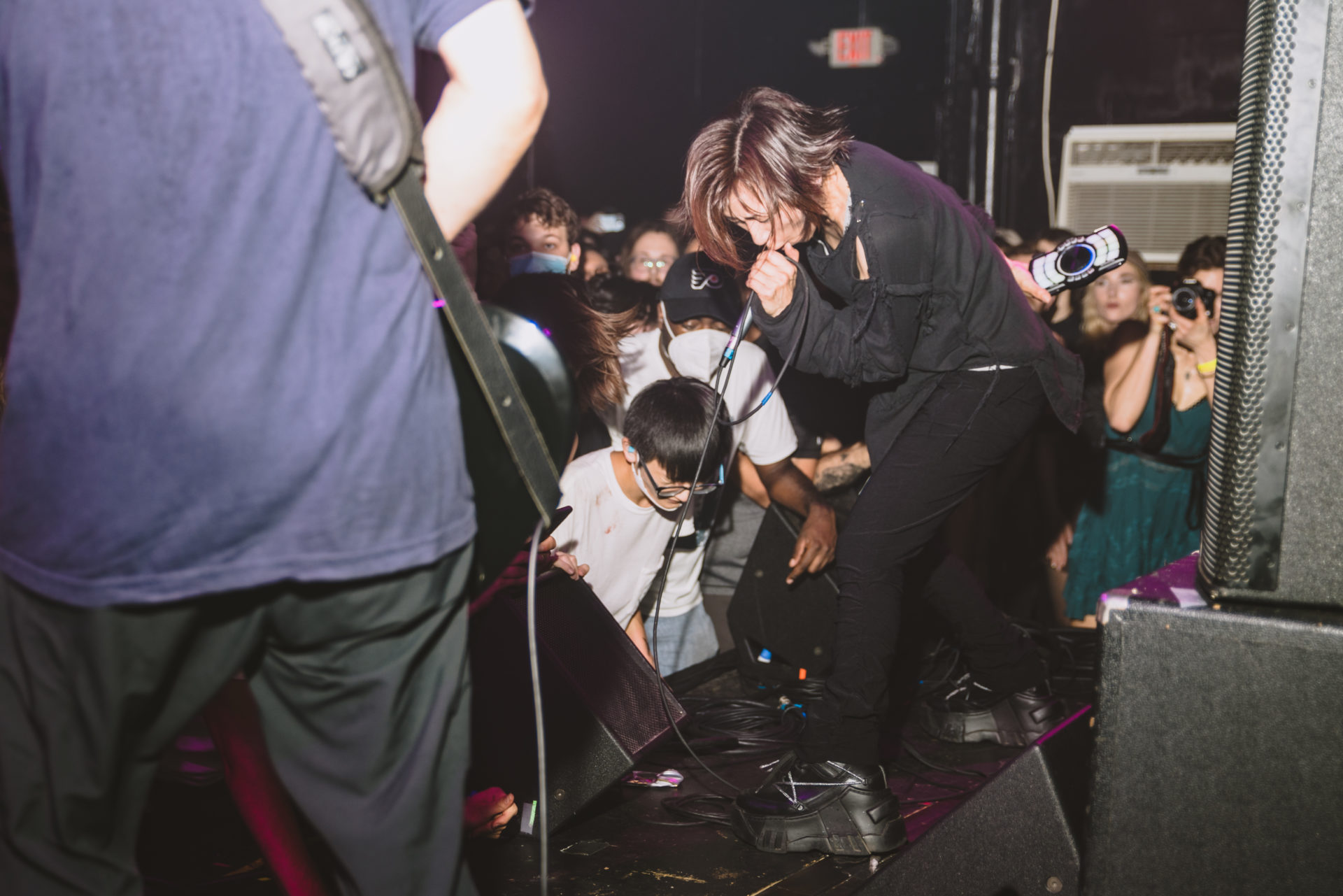
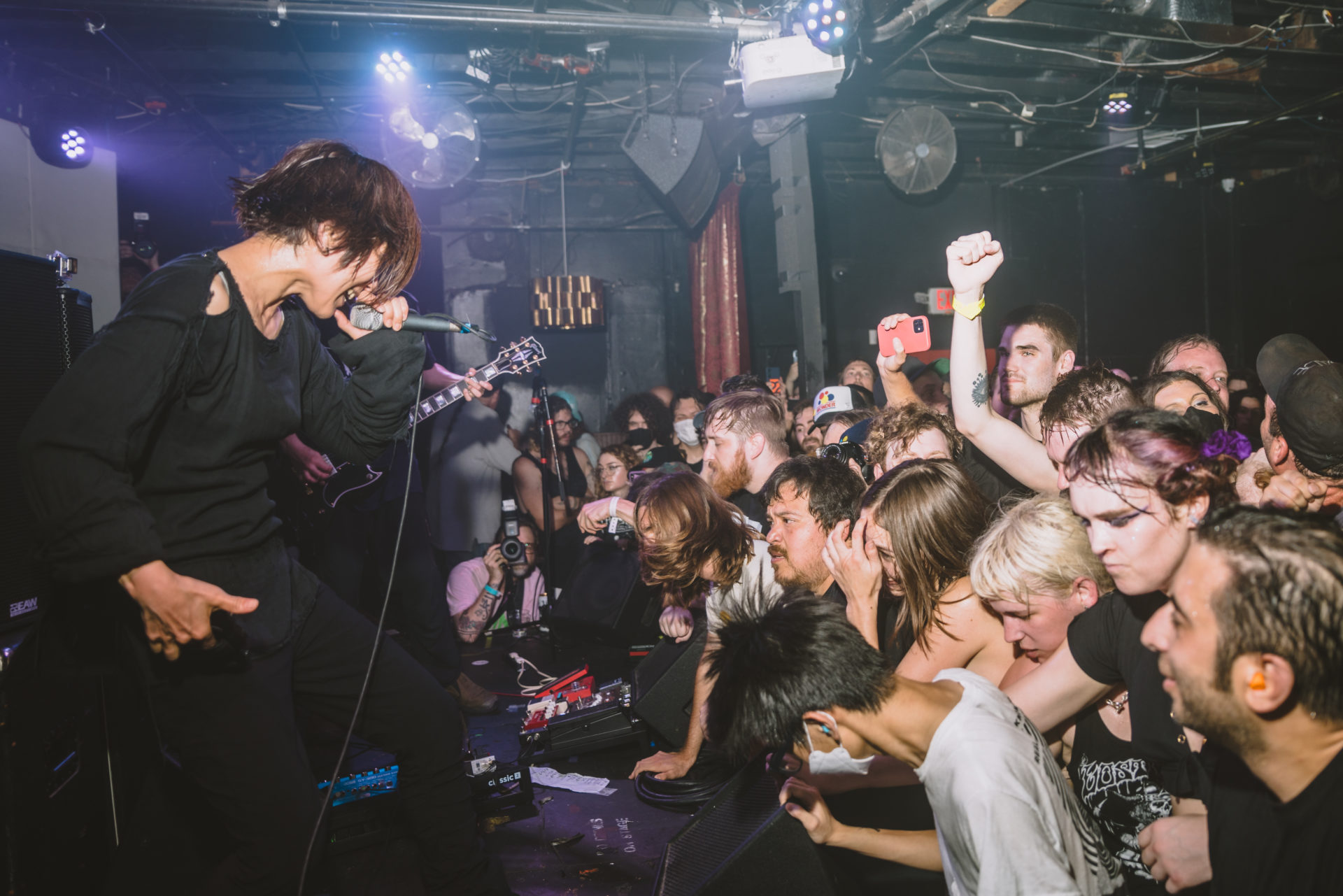
Even only being in the pit for about 15 minutes left me drenched in sweat — both my own as well as others’ — and left some strange stains on my white shirt that I have yet to get out. I felt fortunate to have had the chance to see Melt-Banana do their thing live. At the end of the set, a staff worker was choosing who would get the setlist, jokingly taunting eager fans until picking one man. One girl pleaded with the man for the setlist because it was apparently either her birthday or her sister’s, ultimately to no avail after a little consideration by the man (good for you, brother).
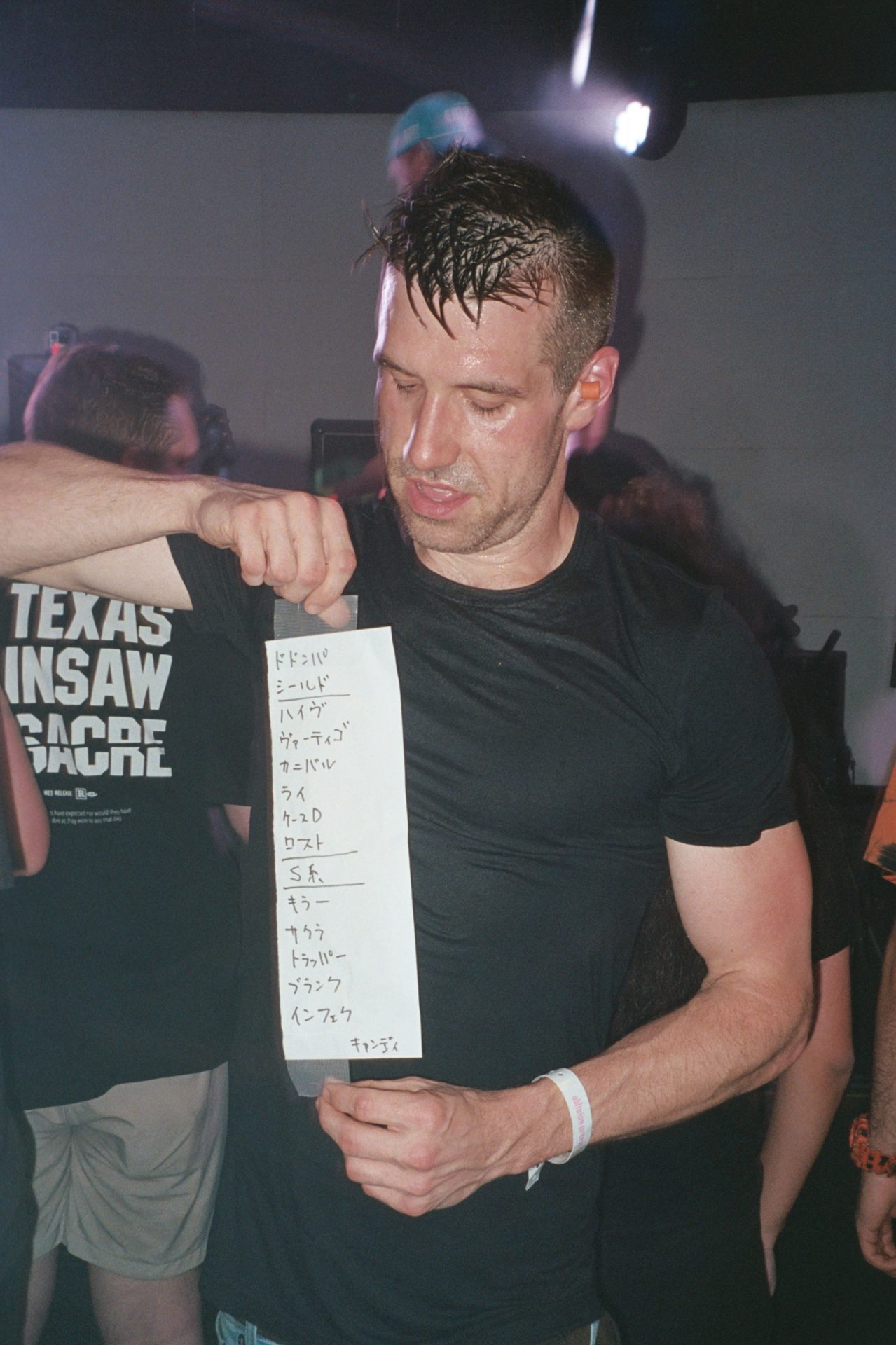
Next on my schedule was another rapid stylistic change, this time accompanied by an equally drastic change in setting: The Microphones at Central Presbyterian Church.
Day show at Central Presbyterian Church
As the festival schedule was originally planned, Melt-Banana and The Microphones would overlap entirely, but delays in both shows meant that The Microphones would now begin a bit after Melt-Banana, giving my friend and I enough time to walk to the venue still drenched in sweat and stink. I was eternally grateful that the powers that be allowed these two sets to not coincide because these two would end up being my two favorite sets of the festival, for completely different reasons.
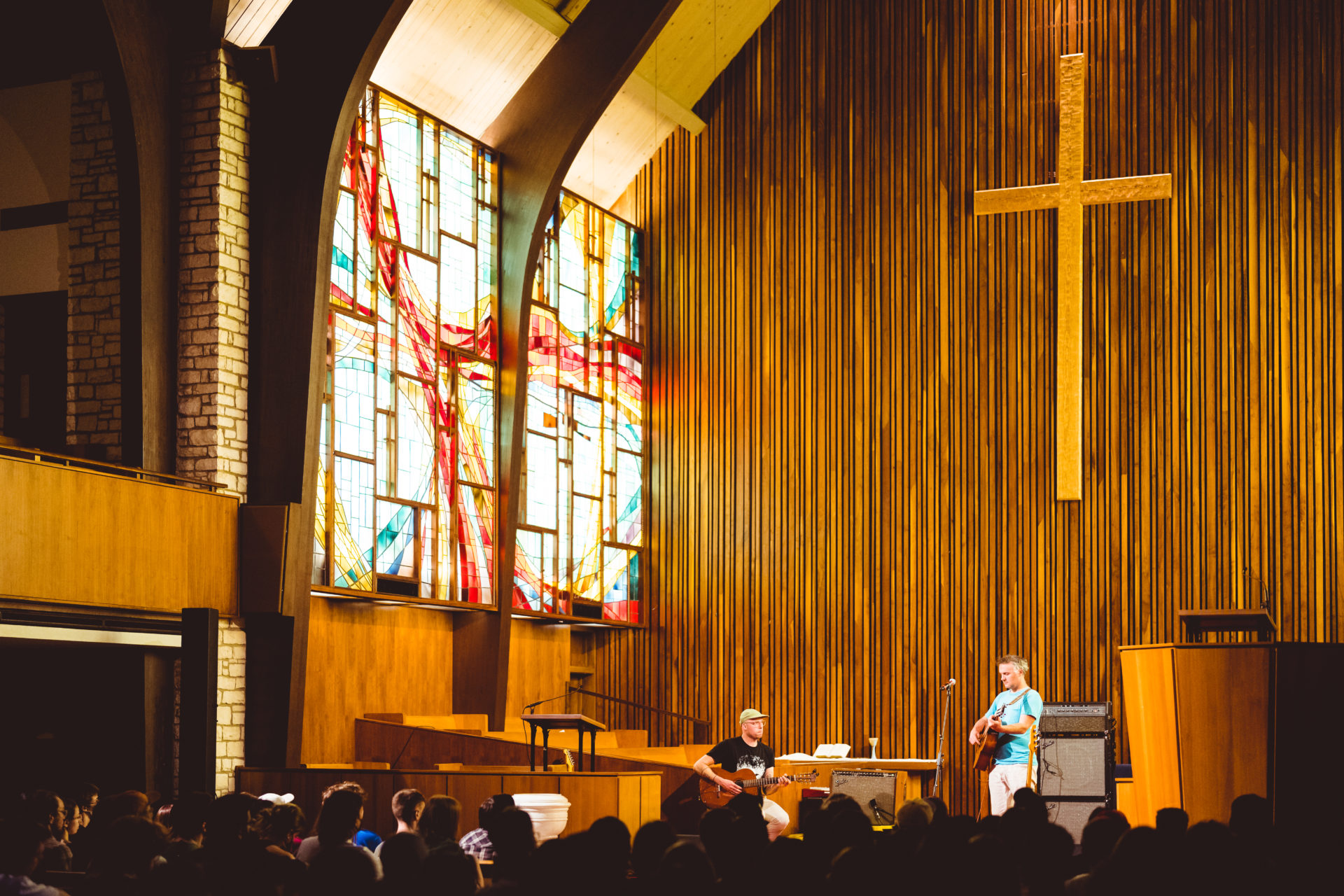
When I arrived to The Microphones’ set, it was just in time to catch sole member Phil Elverum in the midst of the opening alternating chords for his 44-minute long track, “The Microphones In 2020”. In all honesty, I was a bit saddened upon finding out months prior that his recent live shows only consisted of this song. It wasn’t that I didn’t like the song, but rather that it didn’t have nearly the replayability of earlier Microphones tracks — like those from the classic The Glow, Pt. 2 or It Was Hot, We Stayed in the Water — meaning I hadn’t grown to love it like I did other tracks. However, I would walk away from the show feeling completely differently.
“The true state of all things,” began the song, and for the next 40 minutes Elverum went into a deeply reflective piece looking at his own life as well as the world around him with a vulnerability and honesty that brought a tear or two out of me.
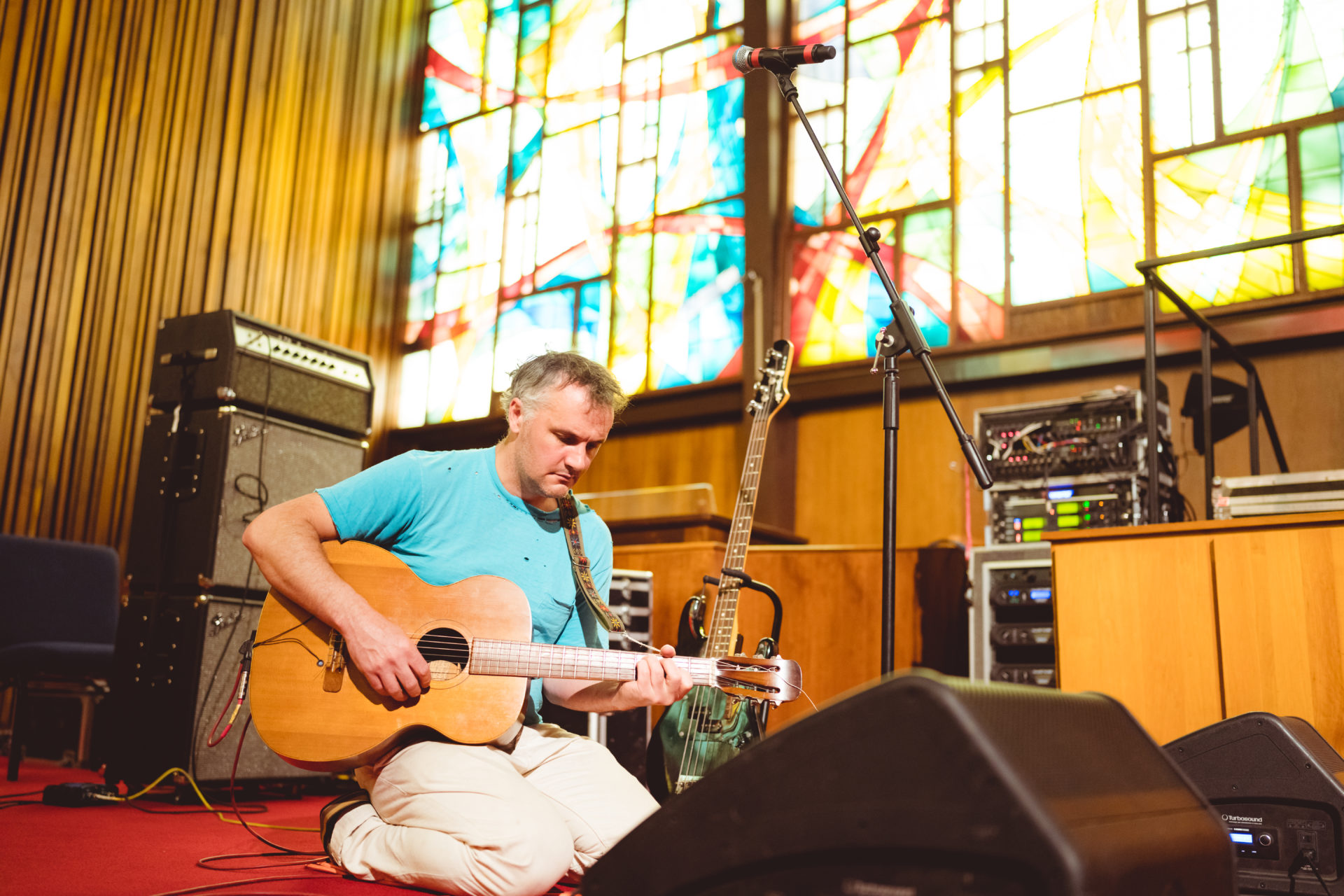
Sitting in this church — similar to ones from my childhood — hearing one of my favorite artists from my teenage years talking about being my current age and deciding what he wanted to do with his life and how he wanted to do it struck the deepest chord in me. Of course, I’d already heard this song, but seeing this song in person was an experience words truly couldn’t describe. Still being filthy from the previous set added to this feeling, as if I had gone through some kind of long trek to get to this point where I could finally be considered worthy enough to hear this wisdom.
Lyrical passages were interrupted every so often by enormous-sounding instrumental interludes where Elverum switched from acoustic guitar to electric bass and filled the church with the droning tones that would be fitting at a metal show. To me, these passages represented the indescribable feeling that comes to one in moments of great realization, moments like this one for myself and moments like being alone on a beach in the northwest for Elverum. The sound from these passages was enough for some people to cover their ears, but I felt so entranced I don’t think I could’ve even if I wanted.
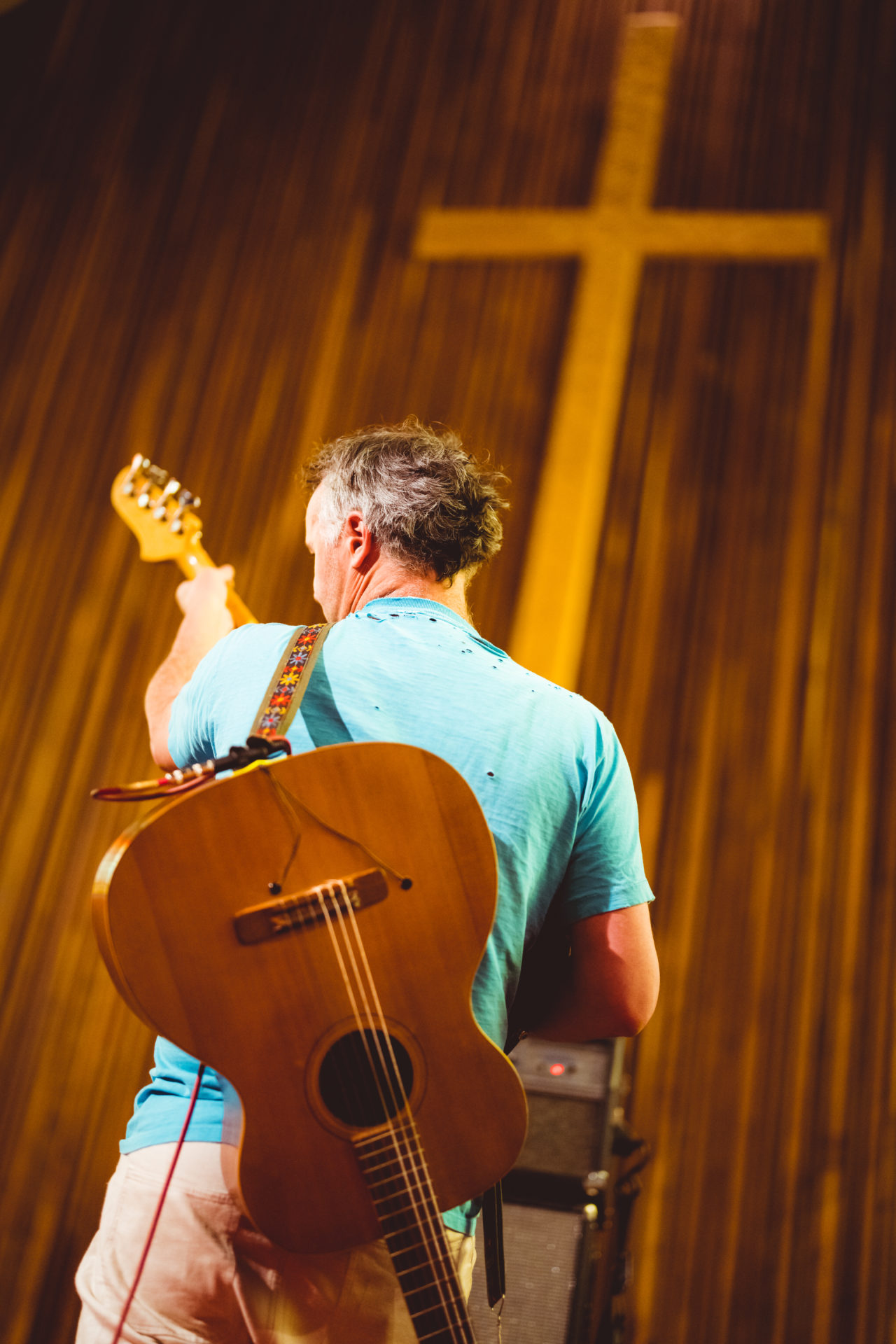
When he finished the instrumental passages, he spoke of things like thinking of the moon not as an abstraction but as a real, giant hunk of rock floating in space and feeling small, or even just life as a musician, touring and going about his life as a young adult. One moment that stood out to me was a passage about every moment being a “new collapsing building” with both ourselves and the world around us constantly moving forth and changing, and realizing the absurdity of it all, absurdity that Elverum would try to capture by naming the song “The Microphones in 2020”.
By the end of the set, the absurdity Elverum spoke of was palpable in the air. Here I was with this crowd who had also sat through this all-encompassing musical piece as introspective as it was existential, breaking down the barriers artists put up to speak frankly about life and the questions that come with it, and all many of us could do was laugh. Walking out of the church, I sensed that the general feeling was “well, now what?” Some like myself had other shows to go to that night, others went home, but life now moved on all the same for us all, and that was pretty funny.
The Night Show at Empire Control Room & Garage
At the next show, I was excited to catch the opening band, Austin’s own Grivo. The band made me a fan with their “doomgaze” sound from their two albums Elude and Omit. Their set was everything I hoped for, with reverby riffs accompanying the band’s mellow yet heavy feel. Almost right after their last song, as if reading my mind, my friend said “that was beautiful,” and I was glad that other people felt the same way about what I had seen.
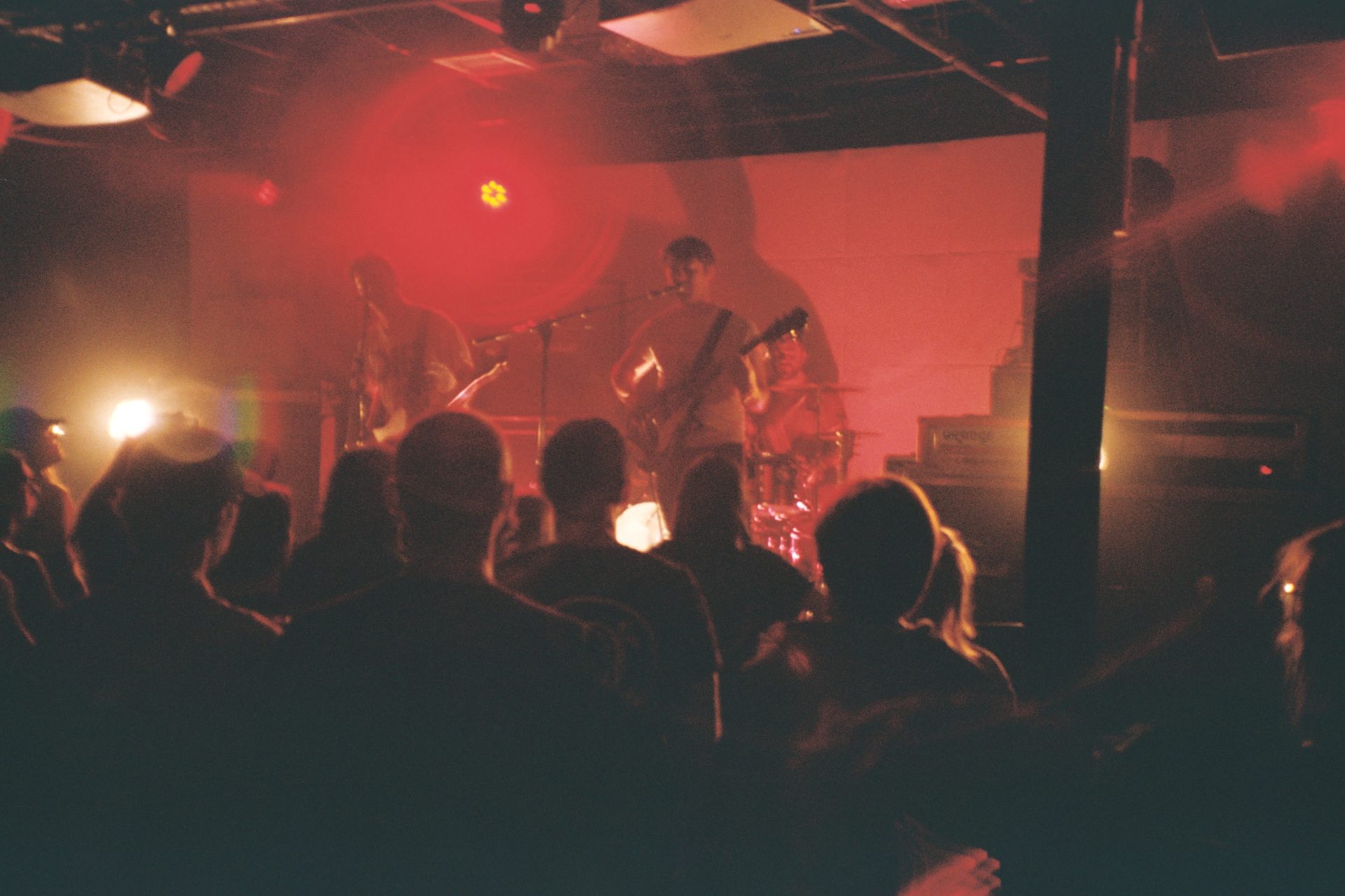
Experimental giants Xiu Xiu were next on the outdoor stage. I got to their set as they were in the middle of “Apistat Commander” from their classic A Promise album. They played on stage with a full band, which I learned later from a friend was a rarity for the band, lining up with footage I had seen of the band’s previous more minimal setups. This change resulted in a sound that was hardly recognizable as experimental, which played to their favor by giving the audience a set that could be enjoyed by people unfamiliar with their music. While I did wish they had leaned into their more experimental side, I was still happy to have seen the band put on a good show.
Back at the indoor stage, A Place To Bury Strangers were next. Like Grivo at the same stage, A Place To Bury Strangers gave everything I wanted from them. Their music was loud, fast, and washed out, and at the small indoor stage, their sound became even more hard-hitting. They were another one of many bands that weekend whose surely damaging volume I didn’t mind. My friends and I left this set a bit early to get good spots for Blonde Redhead at the outdoor stage, which I probably regret.
Soon Blonde Redhead began, and it started great. One of the first songs they played was “Melody” from Misery Is a Butterfly, one of my favorite songs on my favorite album of theirs. After this, though, the exhaustion from the day finally hit me and I found myself losing focus. This was definitely a personal issue, as most people around me seemed to be having a blast, but I just grew more tired as the set continued. Especially after having seen so much heavy music all day, the more clean and laid back Blonde Redhead just might not have been the best decision for me in terms of keeping my energy up.
Maybe if they had gone earlier in the day I would’ve enjoyed their set a lot more and wouldn’t have been on the verge of falling over and sleeping for the end of the set. Still, I certainly found some enjoyment in their set, otherwise I definitely would’ve had to start the walk to my hotel room. When their set ended, I let out a quiet sigh of relief, followed by a slightly louder sigh of relief when they finished the encore. Hopefully I’ll get to see the band again under better circumstances one day.
Sunday
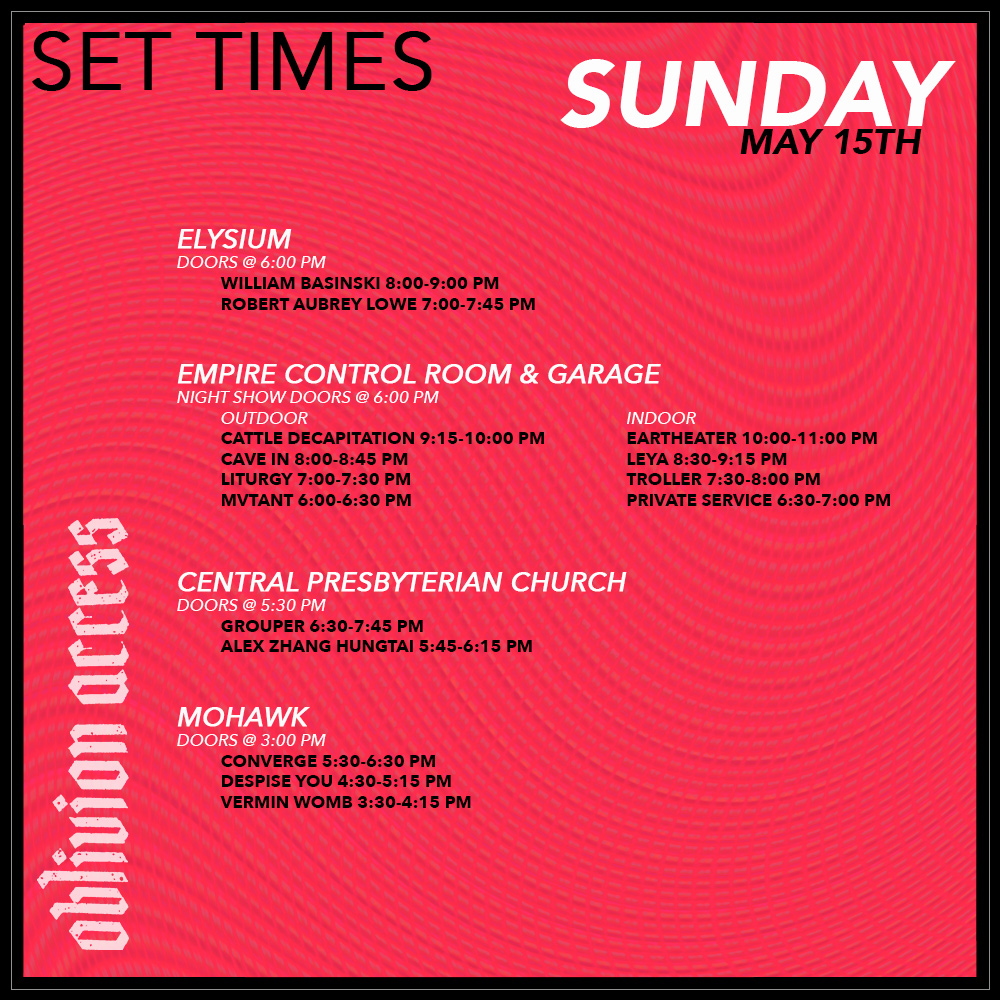
Day show at Mohawk
Because my plans for Saturday diverged slightly from my friends’, I would have to walk to this show on my own and meet my friends at the next show. As mega fans of Grouper, my friends wanted to wait in line before doors opened, which coincided with this show. Luckily for me, I’d still be able to catch Grouper if I left this show a bit early.
I arrived as powerviolence pioneers Despise You were in the middle of their set. Violently West Coast with one vocalist in a Dodgers shirt and another wearing a hoodie in 90-degree weather, the band gave the crowd an energetic performance.
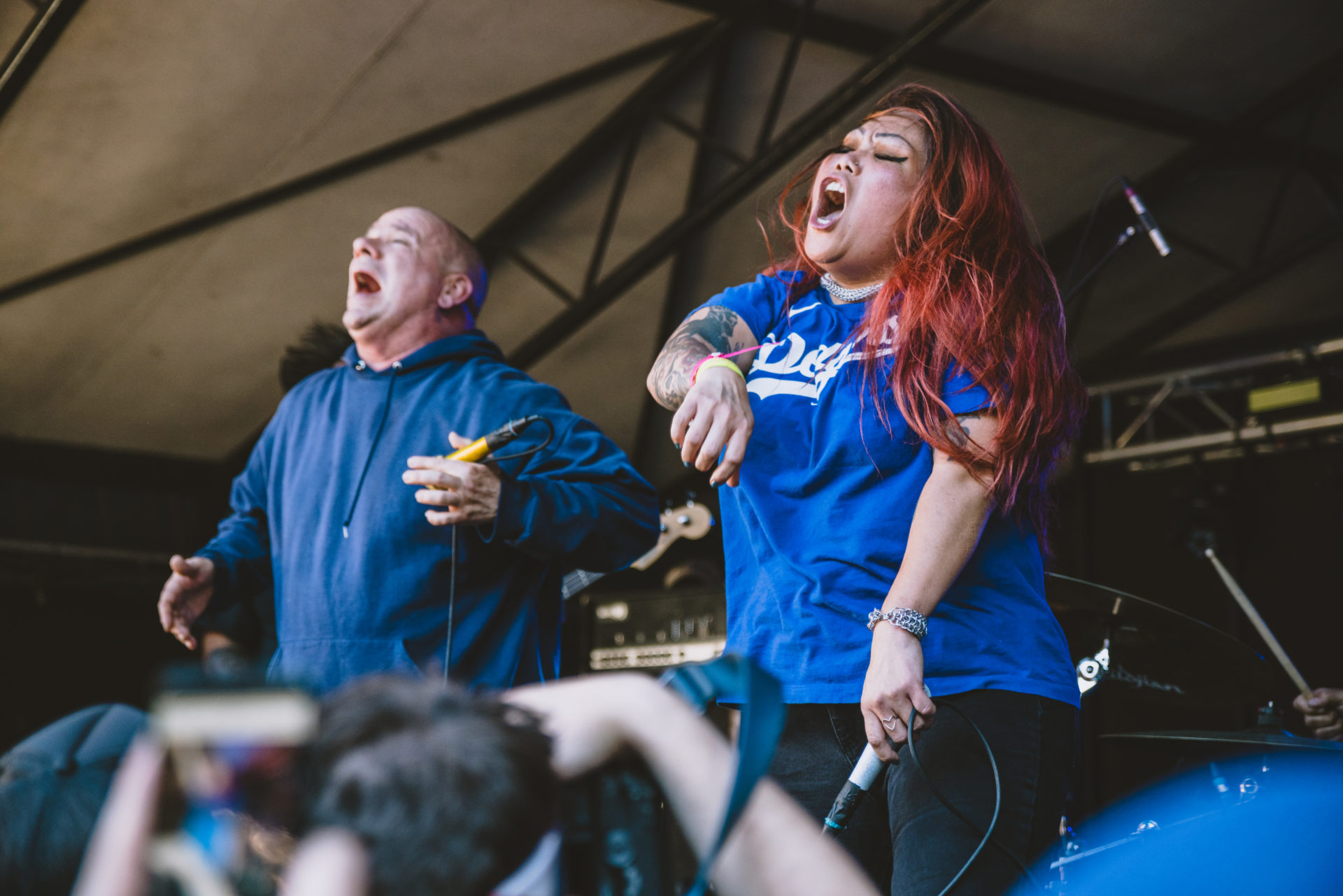
While waiting for Converge, I moved up to get a better spot. Having chosen pit retirement, I got close enough to get a good view of the band without catching any flying limbs. When Converge started, the pit immediately went into action. Though I didn’t get in the pit at any point, I did the peer pressuring this time around by getting my friend I’d found at the show to jump in the pit for a while. She got tossed around a bit but held her own, and this was pretty impressive considering size of those in the crowd.
This was definitely the strongest-looking crowd, with guys in tank tops showing off their large arms left and right. In contrast, this pit was actually maybe the friendliest I’d seen to that point; no one looked like they were out for blood like they did at other shows and the big, muscular men all went in with smiles on their faces. This fact was reflected in the music that seemed perhaps more optimistic than many of its extreme metal contemporaries at the festival. It seemed to me that Converge and their fans came from a place of love above all else.
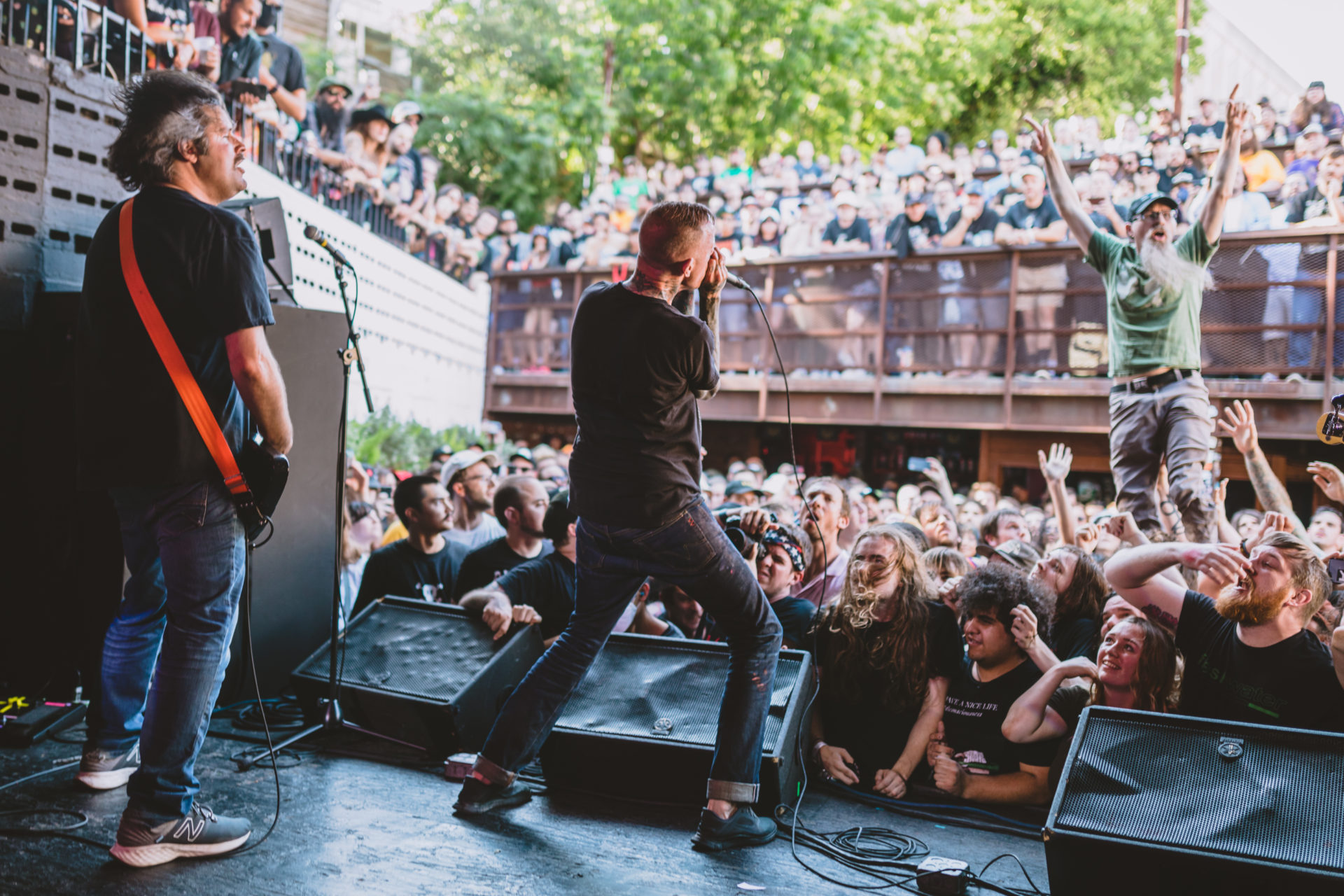
Before I had to leave for Grouper, the band announced a free show the next day. I’d certainly consider going before I made the drive back to Houston.
I began the walk to Central Presbyterian Church and — to my surprise — arrived while opener Alex Zhang Hungtai was still performing. His set didn’t particularly stand out to me, but one of my friends who had seen the whole thing and was particularly moved by it told me that seeing it from start to finish is what made it great. This explanation made sense since I had walked in on a very abstract piece that was certainly missing some important context.
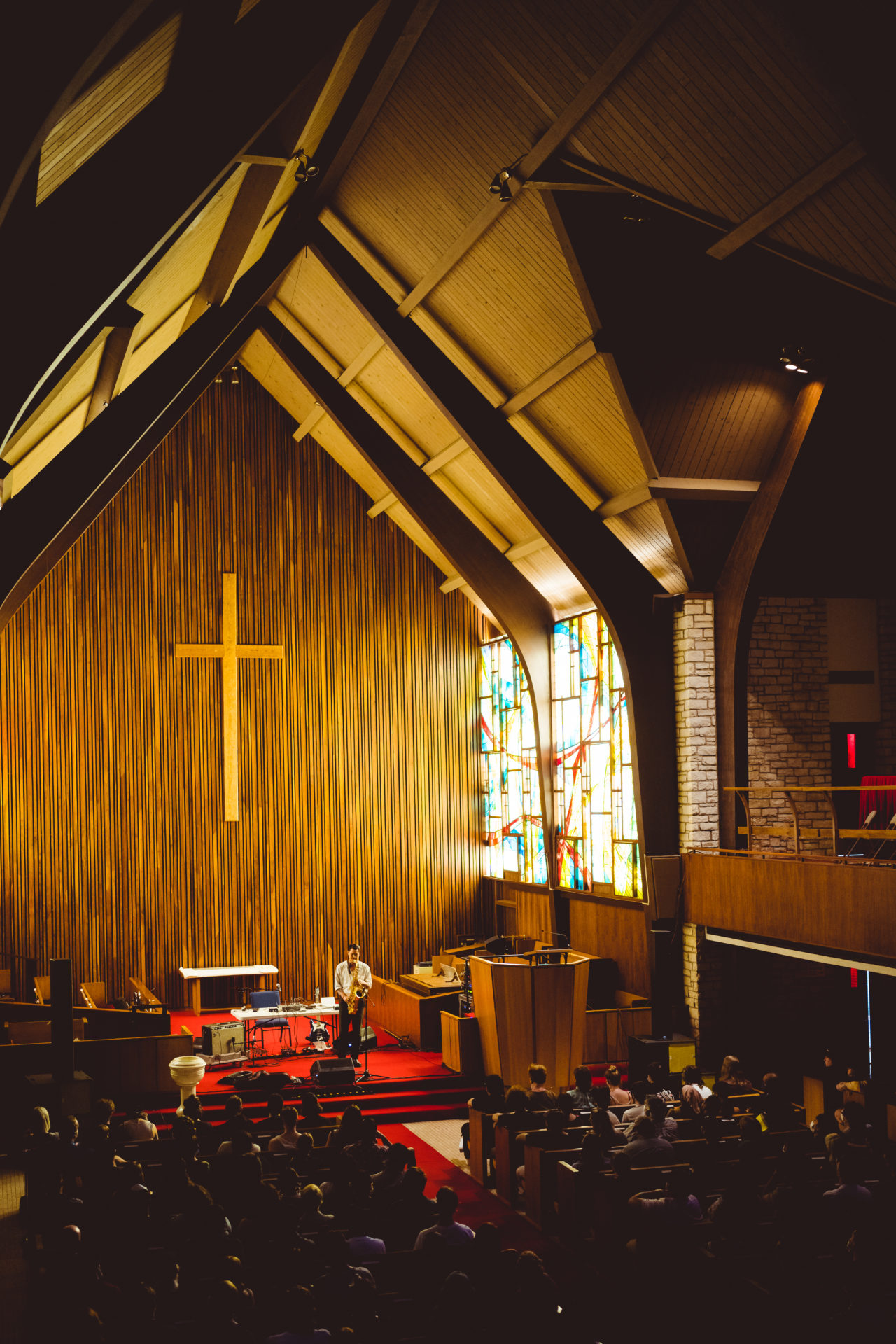
After the set, I went down the aisle to meet my friends who had graciously saved me a spot up front with them. Excitement and curiosity filled the air as we waited for Grouper to take the stage. Grouper, the project of Liz Harris, has spent almost two decades creating ethereal ambient music in a way that has made fans out of people who wouldn’t normally be huge fans of ambient music, like myself. The inexperience of those fans within the genre created an atmosphere where no one was sure what exactly to expect.
As soon as the lights turned off, all conversations immediately halted. There was one stray light still on until Harris pointed at it and it turned off, leaving a large projector and the evening light from outside as the only sources of light in the church.
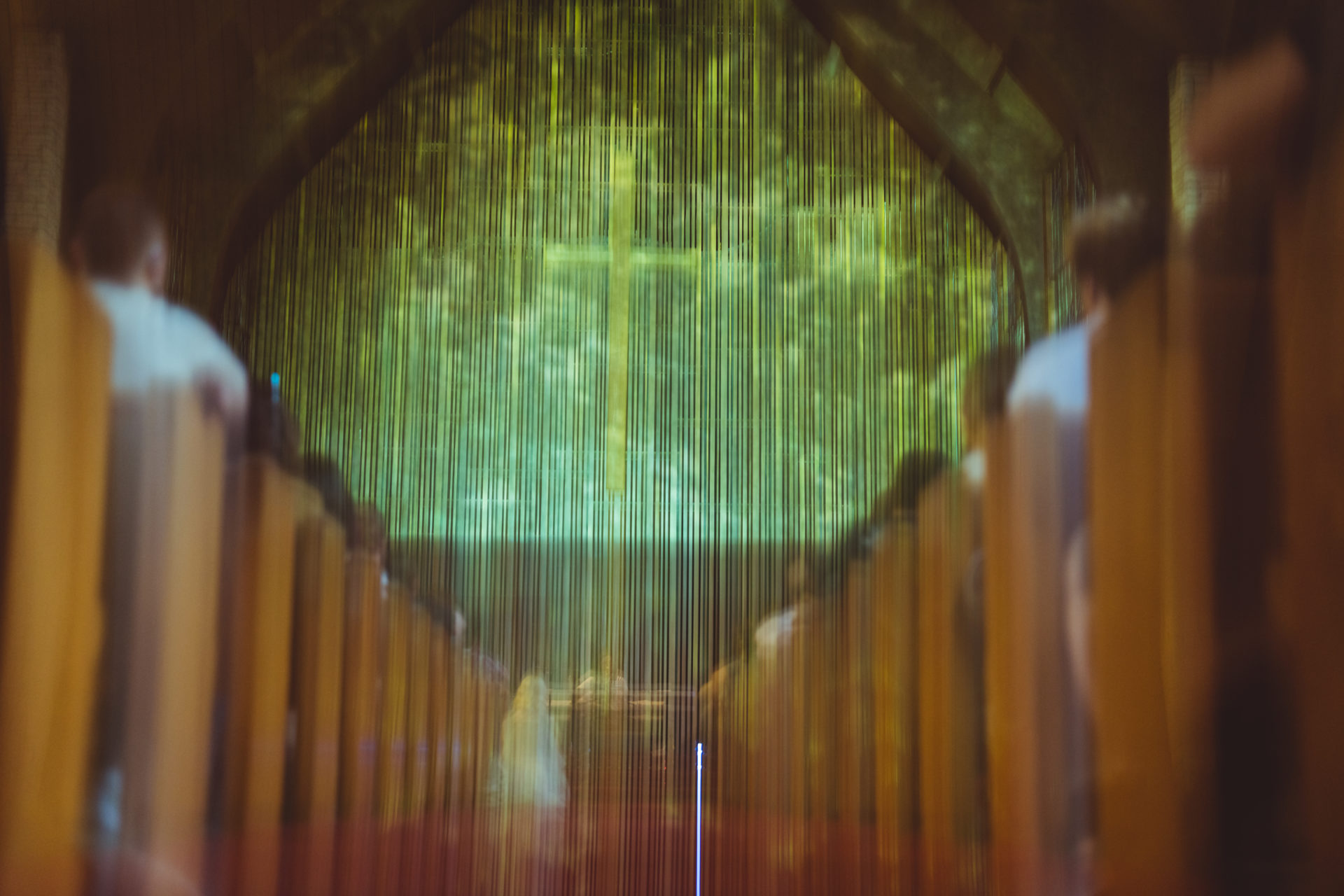
Behind Harris, a series of abstract projections lit up the wall. After a minute or two of quiet darkness, she crept into her first song, “Alien Observer”. Like on the recording of the song, she created a soundscape using her voice, leaving her voice floating within the walls of the church. The song’s chorus echoed feelings of dissociation with lyrics like “alien observer in a world that isn’t mine.” I found it interesting that both headliners at Central Presbyterian Church, Harris and Elverum of The Microphones, sang themes dealing with the concept of the self and what it means to be a person living on Earth.
Where Elverum’s performance was focused largely on the lyrical aspect, though, Harris’ was focused on the musical aspect, to me at least. What this meant for me was that Harris’ performance was more of a blank slate that the listener could assign meaning to as opposed to a performance with clear themes throughout.
Being unfamiliar with songs beyond “Alien Observer”, I felt more able to become entrenched in the performance. Projections on the screen went from abstract to clips of what looked to be nature, accompanied by sounds of nature. I remember water being a common source of the natural sounds, whether it be through rain, puddles of water, or running water, as well as things like rustling leaves or footsteps on leaves.
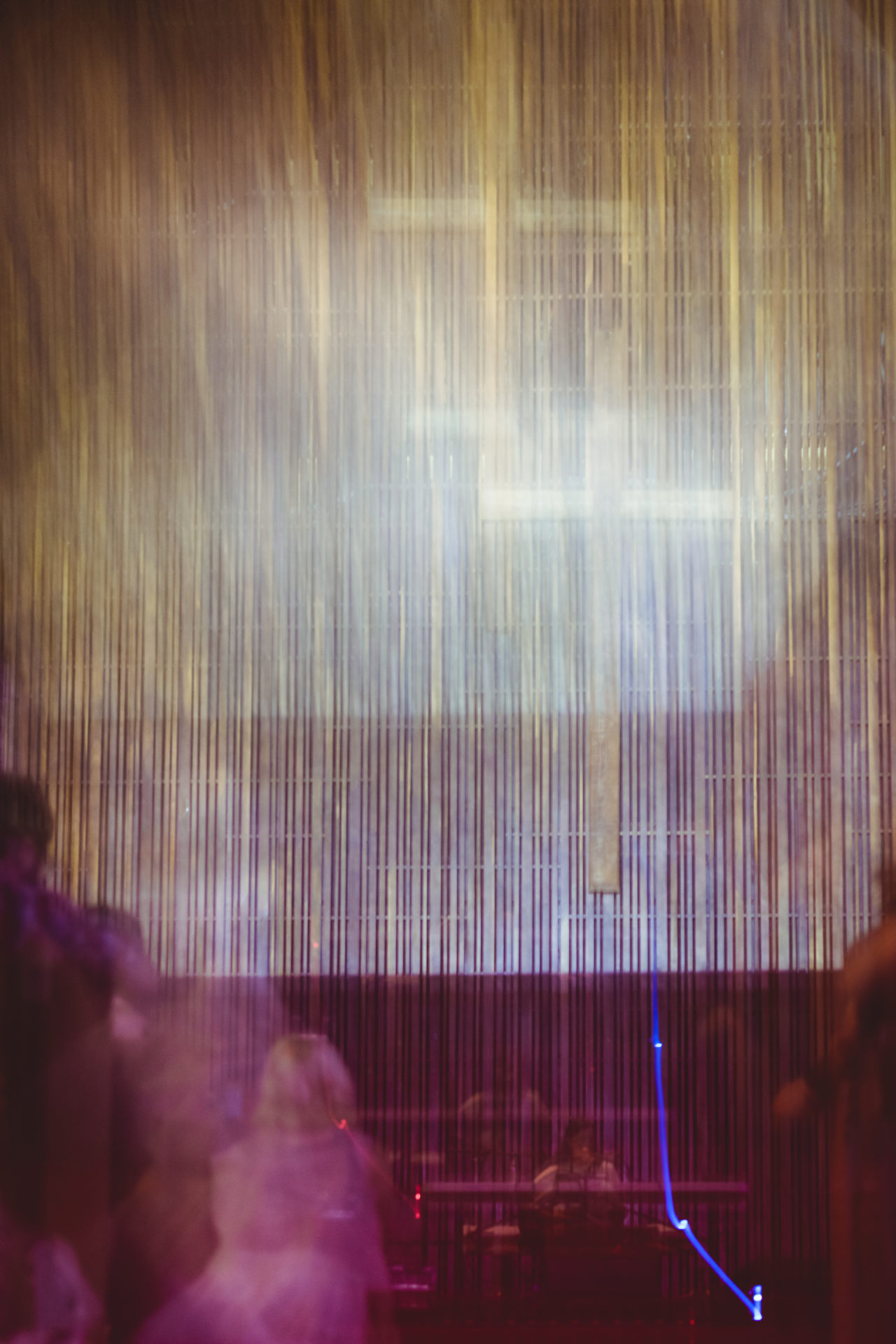
As the set progressed, I found myself almost hypnotized by Harris and her music. I certainly couldn’t blame the people who were recording clips on their phones, but I personally found myself unable to do anything other than get lost in the little world being created around me. As trite of an observation as it is, the large cross above Harris really gave the feeling that I was witnessing something sacred, something that shouldn’t be interrupted by anything.
Finally, when the music stopped and all the sound cut out, I was in such a daze that I jumped a bit at the absence of sound. I didn’t know how to explain what I’d felt, and I still don’t, but I left knowing I’d seen something incredibly special.
Too emotionally tired to catch any sets immediately after, my friends and I would go to one last show for the night after having some time to recover.
The Night Show at Empire Control Room & Garage
I arrived at this show pretty late, having missed Liturgy to my great dismay. I saw a bit of Cattle Decapitation’s set, which opened with a heartfelt message regarding the recent passing of founding member Gabe Serbian from his Locust co-member Justin Pearson.
As Serbian surely would’ve wanted, the band went into their set as hard as ever. Their grindcore sound was all the more impressive live as the technical proficiency of the members was on full display. Though only familiar with little Cattle Decapitation or Locust music, this set seemed like a touching tribute as well as a deserving send off for someone who had such a great impact on the underground and extreme metal scenes.
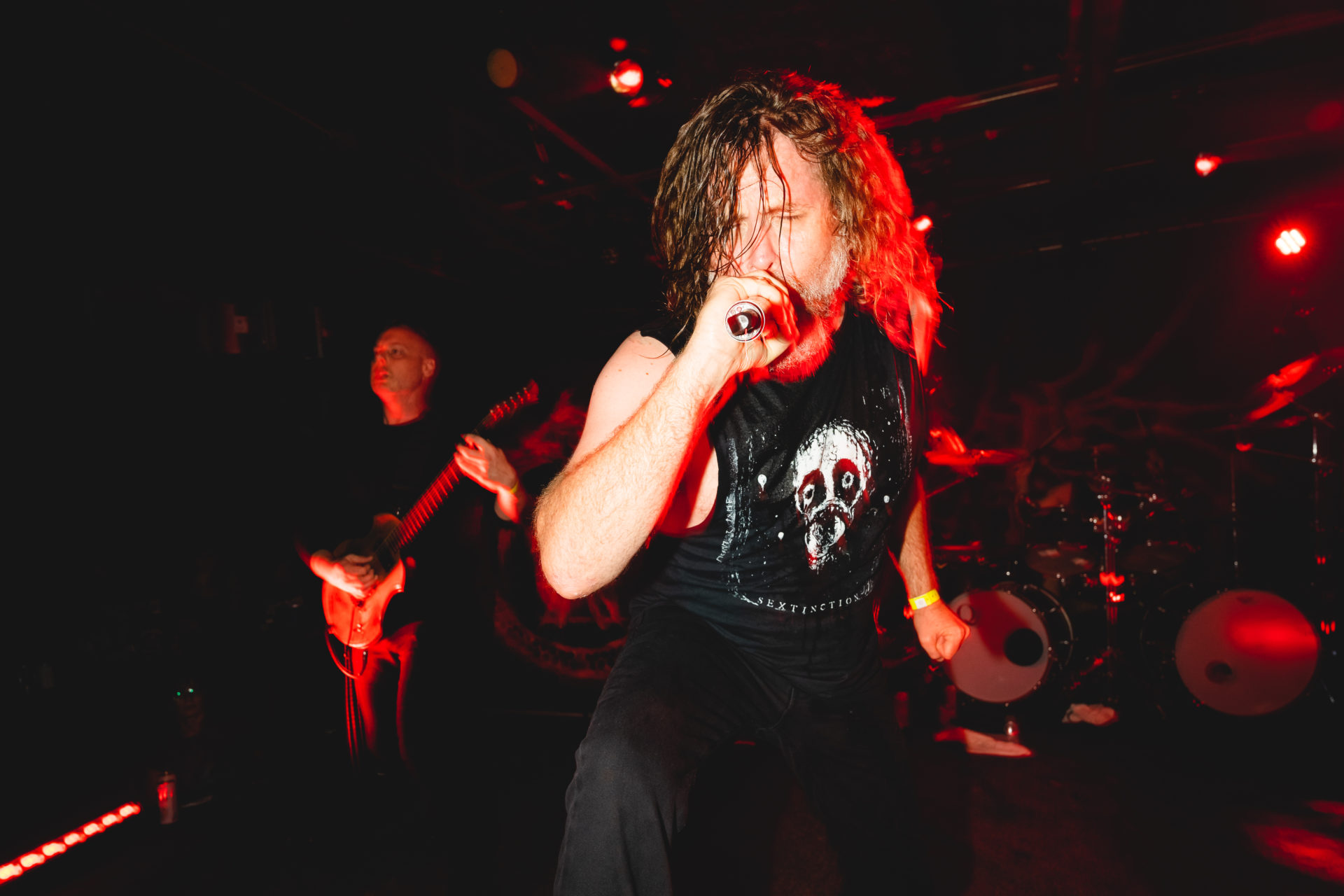
My group left this set early to be as close as we could to our most anticipated act of the night, Eartheater. We’d all talked about how excited we were for her set and were expecting her more popular, electronic songs. The harp on stage should’ve been a clue to us that this set would be more acoustic, but we all somehow still had the expectation of hearing songs from her 2019 favorite, Trinity.
What we were met with was a more acoustic set that consisted of Eartheater’s more stripped-back songs. Though we were a bit confused at first, this departure from our expectations was something we would all end up enjoying. In a sense, I felt that the energy from the Eartheater show we expected was still present, with interactions between performer and crowd being reminiscent of a more upbeat performance. One example of this was Eartheater’s decision to stage dive during one of the instrumental passages of a song, referring to it as an “ambient crowdsurf.”
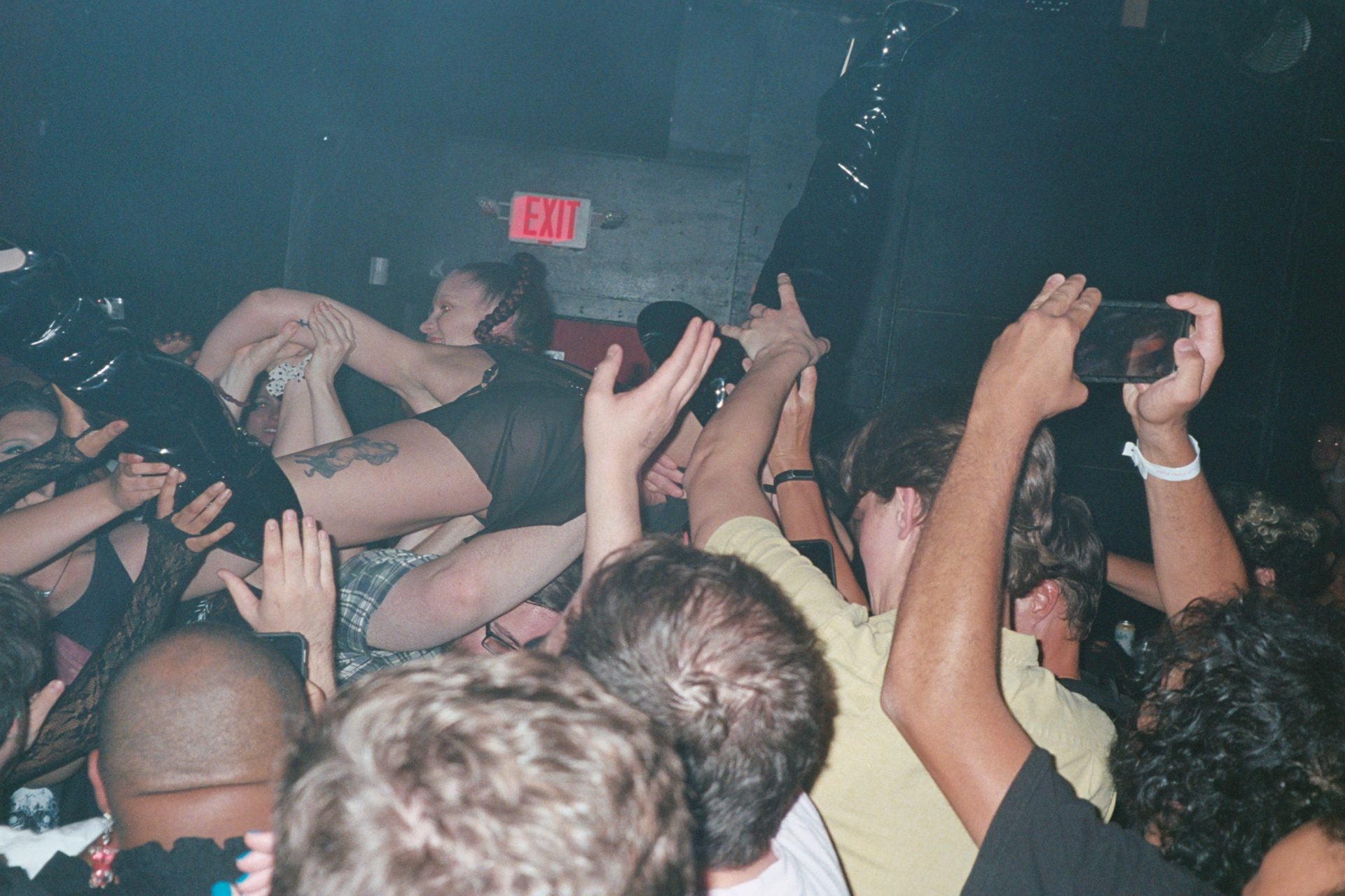
Her skills were perhaps more noticeable during this acoustic set than they would’ve been with an electric set, such as her impressive vocal range being shown on songs like “Below The Clavicle”. Those accompanying her on stage — a harpist, a violinist, and a DJ — were also great talents. Even though our expectations were defied, no one I was with had anything negative to say about Eartheater’s set. After a weekend of great shows, this served as an appropriately heartfelt goodbye to the festival that made it all happen.
Monday
Although it wasn’t a part of Oblivion Access, Converge’s free show the next day felt like the real end of the festival for me, partially since I didn’t get to see the end of their set the day before.
The show took place at Little Brother Bar, a venue far too small to hold all of Converge’s crowd. I got a good spot right behind the stage, but most had to see them from even farther back or across the street for some. The crowd definitely enjoyed the opening bands, but the feeling changed completely when Converge began their set. A pit somehow opened up where there was really no room for one, and people began shoving and moshing right in front of the bar entrance. The tight space and DIY atmosphere made this show feel like you were watching your favorite local band instead of one of the most successful underground metal acts of the last 20 years.
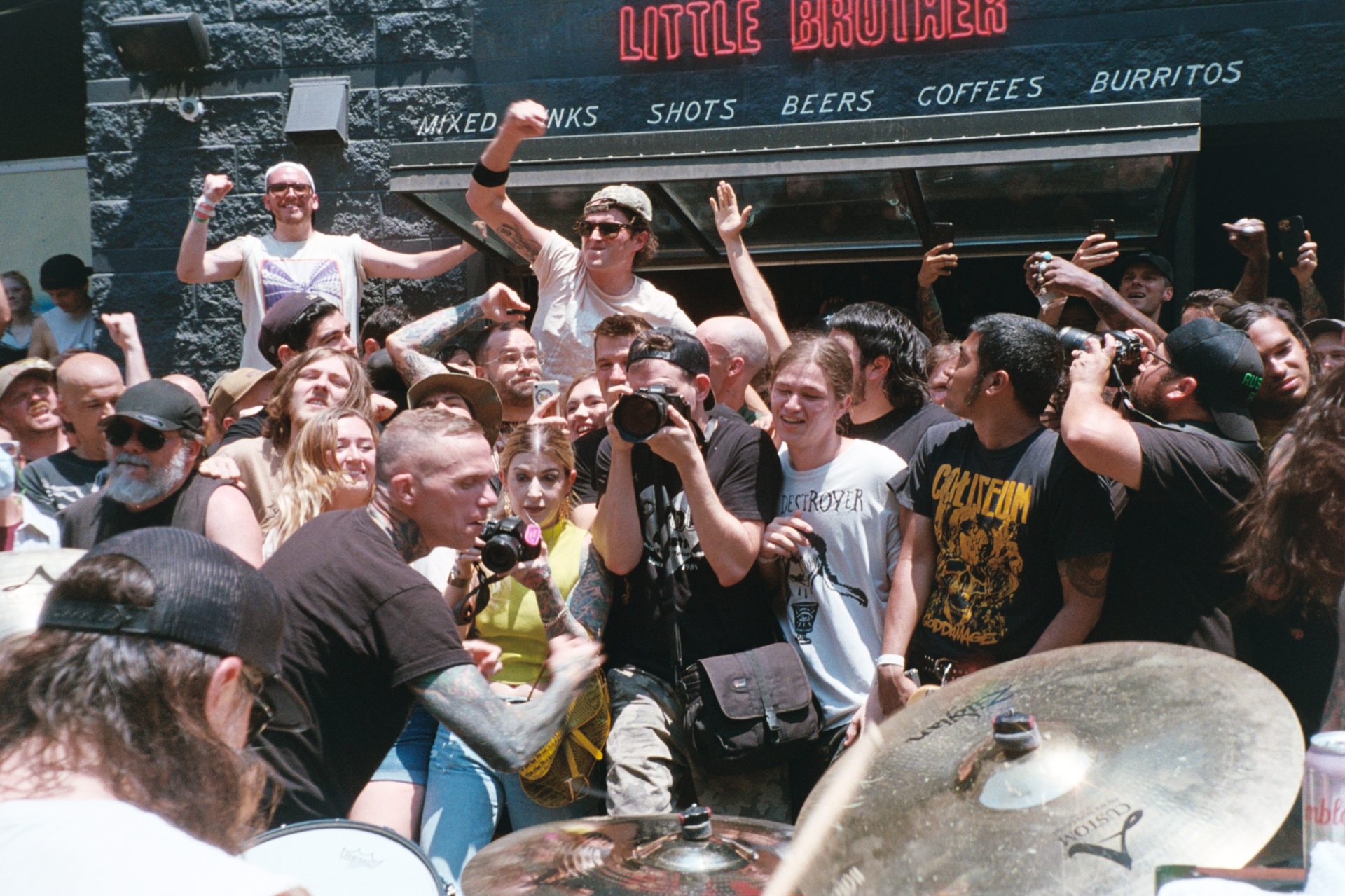
My friend asked if I wanted to move towards the pit, to which I quickly agreed, retiring from pit retirement. Being right in front of the band, watching people get shoved on the stage and within a foot of the band themselves is a kind of fun you have to experience to understand.
Inspired by my friend who managed to crowdsurf, I decided to try it myself for the first time during their last song. When I heard the opening riff for “Concubine”, I knew for certain what had to be done. After making it on top of the crowd, I stayed up for a good while before losing my balance and being caught by frontman Jacob Bannon mid-song (thank you for that).
I was infinitely glad that I made it out to this show and am very appreciative of my friends who stayed with me in the Texas summer heat to catch this set with me.
As I headed back home to Houston, I thought about how great the weekend was thanks to Oblivion Access. The music was as great as I thought it would be, and that’s not even mentioning all the acts I didn’t get to see: Body Void and Primitive Man and their soul-crushing doom metal, Andy Morin and Deli Girls’ abrasive electronic music, Show Me The Body with their unique rap punk, Spectral Voice and Blood Incantation with their extreme spiritually-charged metal, Liturgy and their transcendental black metal, legendary ambient artist William Basinski, among others. This isn’t necessarily a negative, as it just shows how many worthwhile acts Oblivion Access hosted over the weekend, bringing something for any fan of underground music. It goes without saying that as long as Oblivion Access continues to exist, I will continue to be there for it.
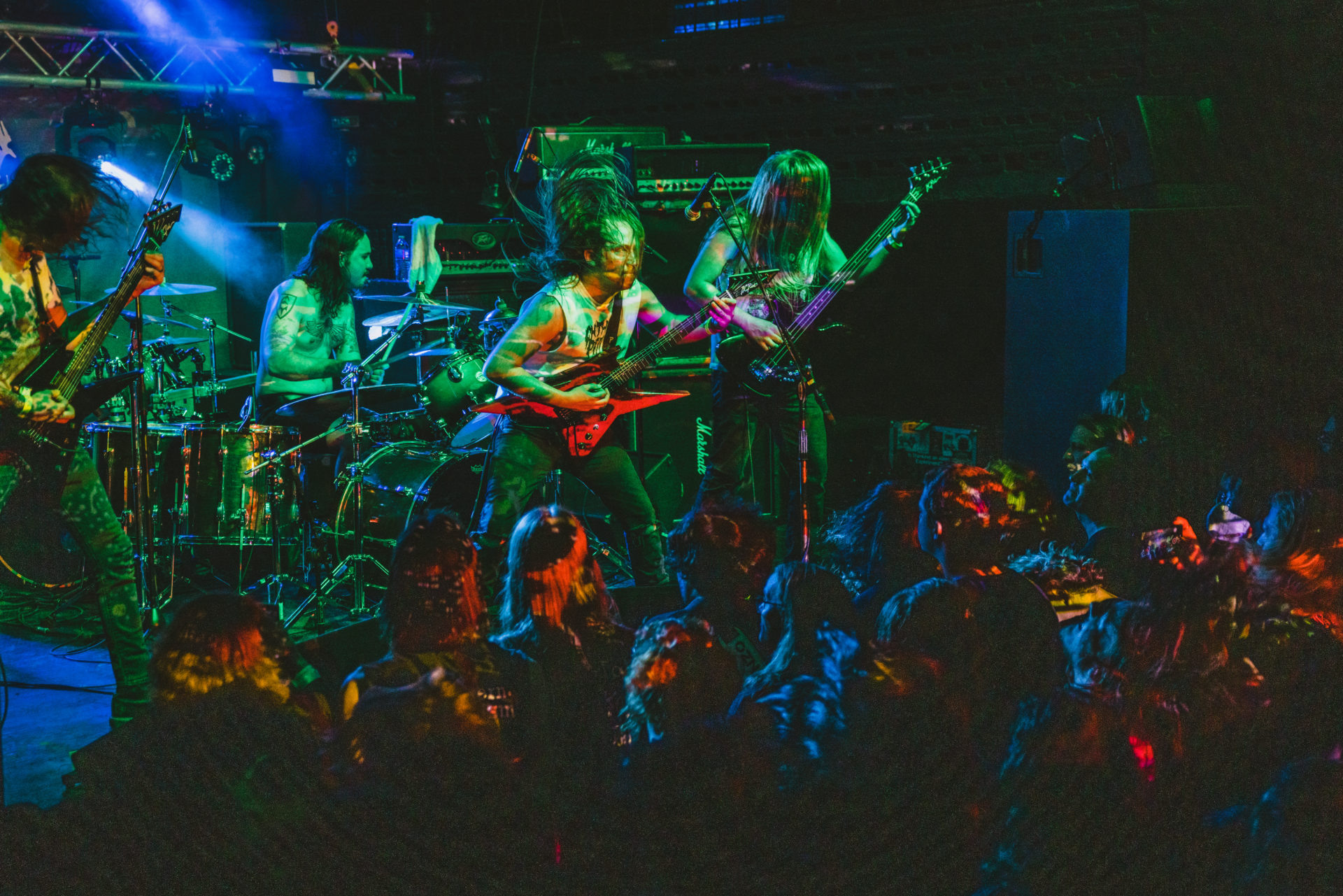
Music aside, the people also made this festival great. The crowds were all people excited to see their favorite bands and I felt nothing but good energy the whole weekend from everyone. The variety in people was also something notable. Being present at metal shows, rap shows, and acoustic shows, I saw a multitude of people all united under one festival. It was clear that Oblivion Access was an event for everyone, where anyone would feel welcome.
I’d also like to thank all the people that accompanied me throughout the weekend: Gabby, Jair, Darshak, Joey, Aliyah, Jacob, Attila, Lily, Sam, and of course the people who made it all happen for me: Jura from Coog Radio and Trey from Oblivion Access. Without those around me, my time wouldn’t have been nearly as fun, so I appreciate you all very much.
